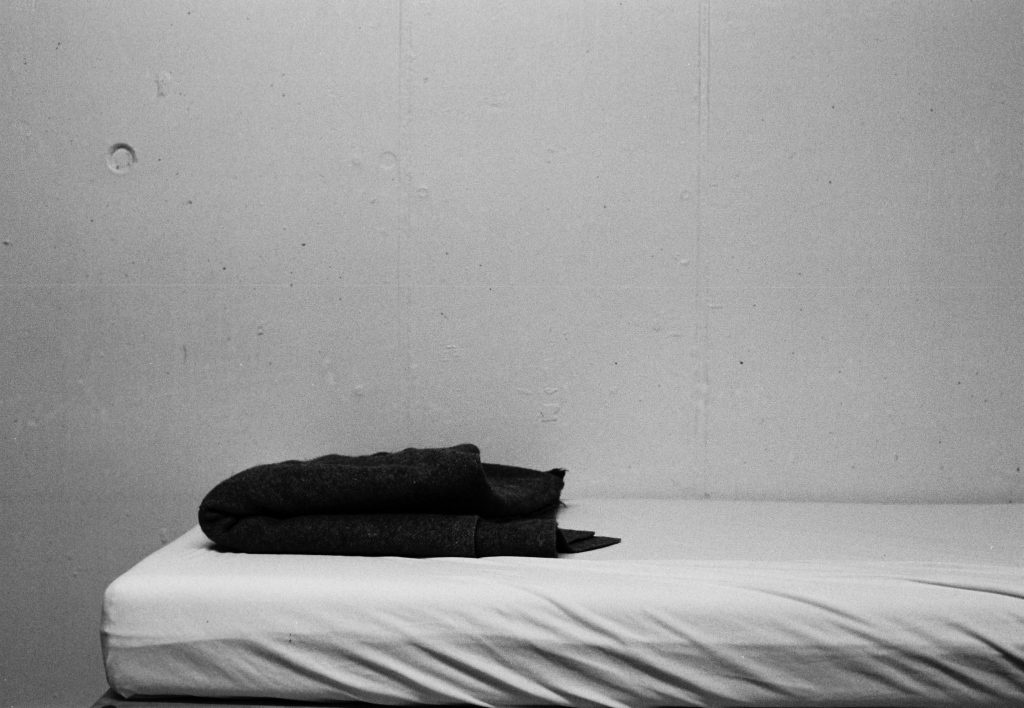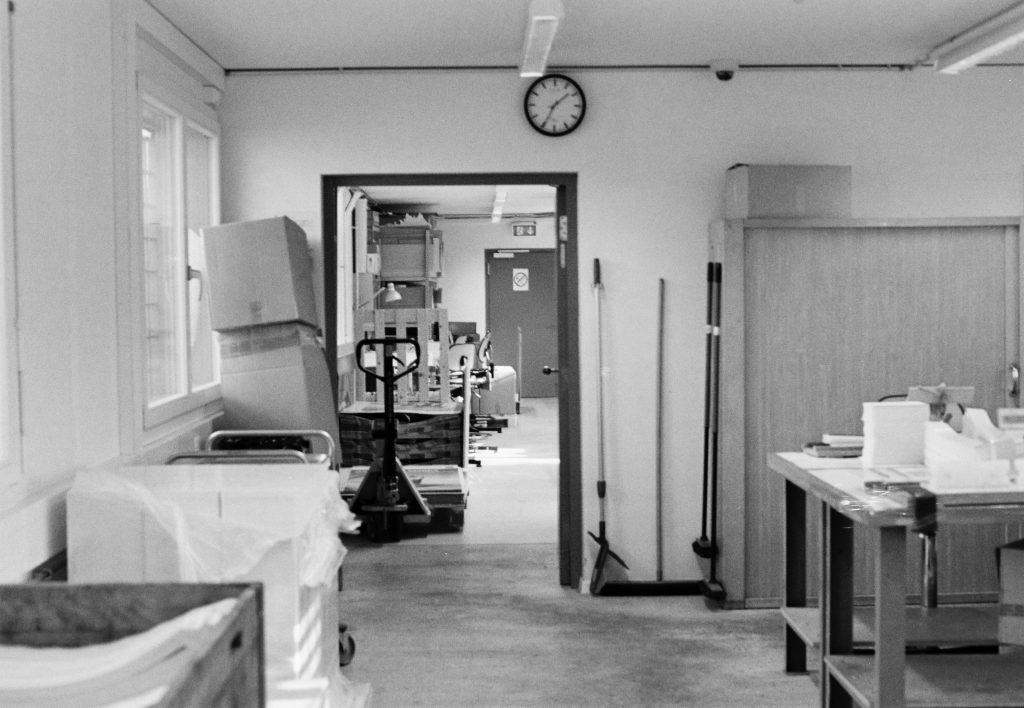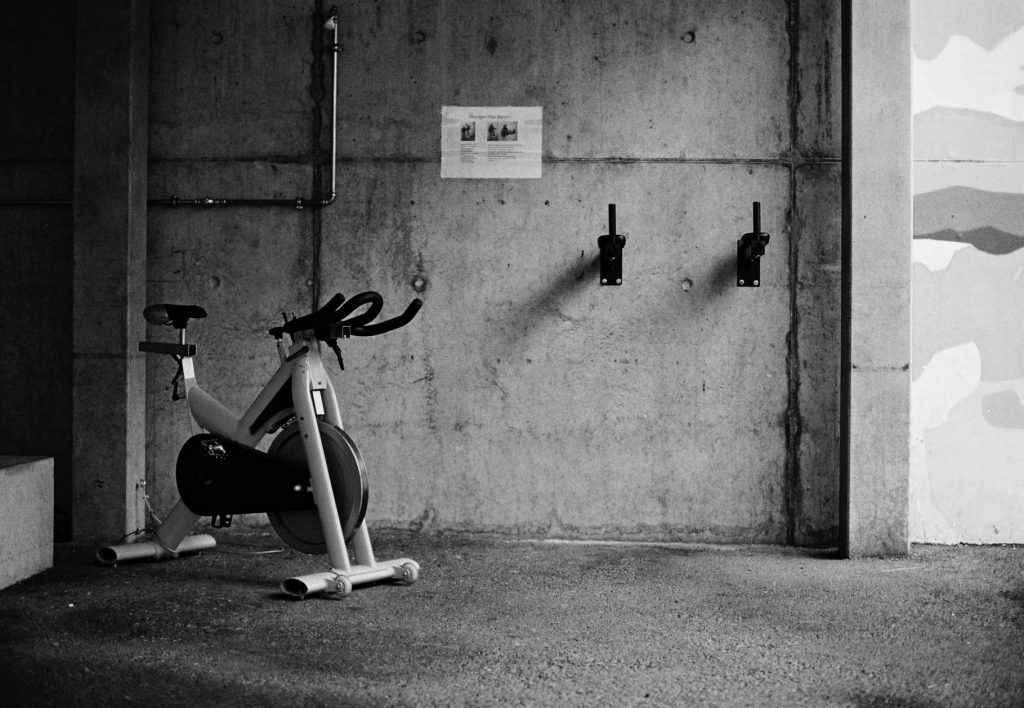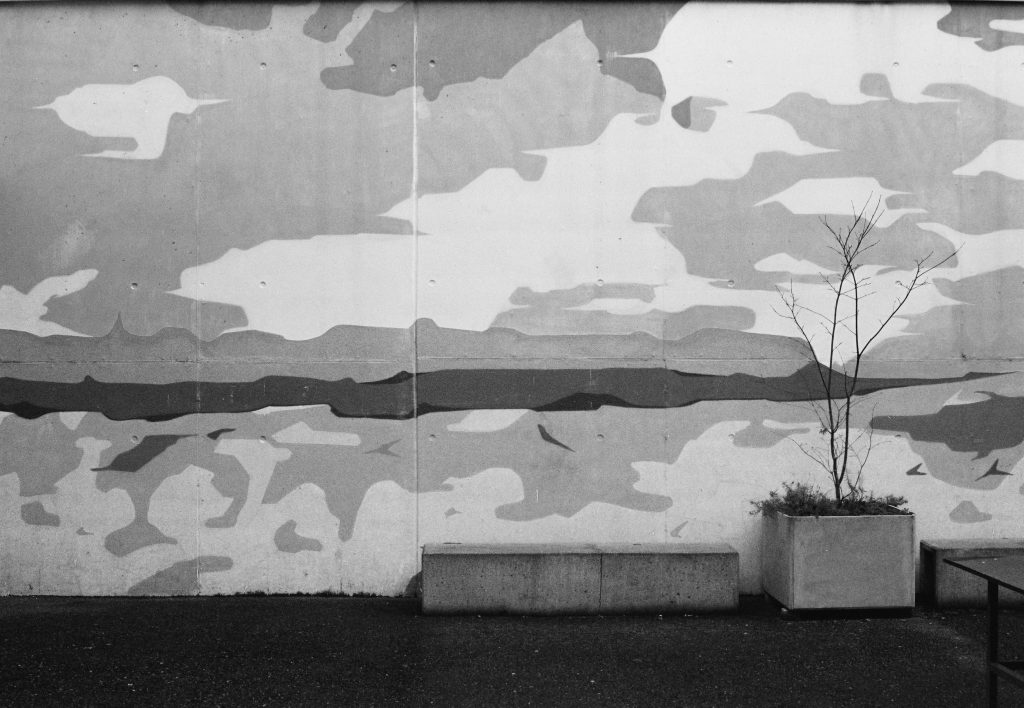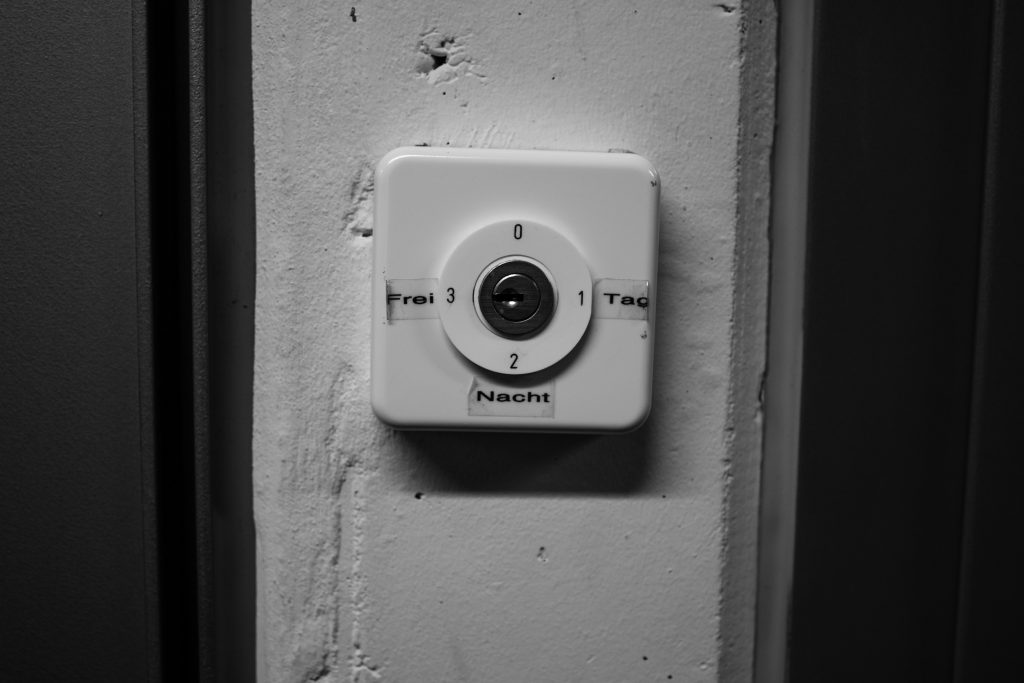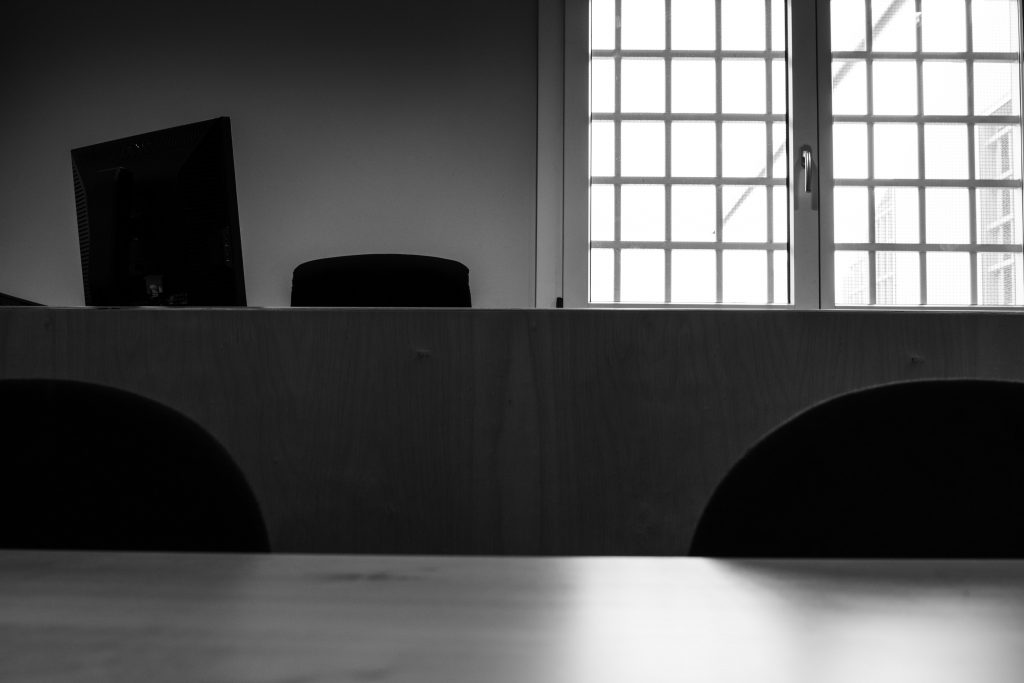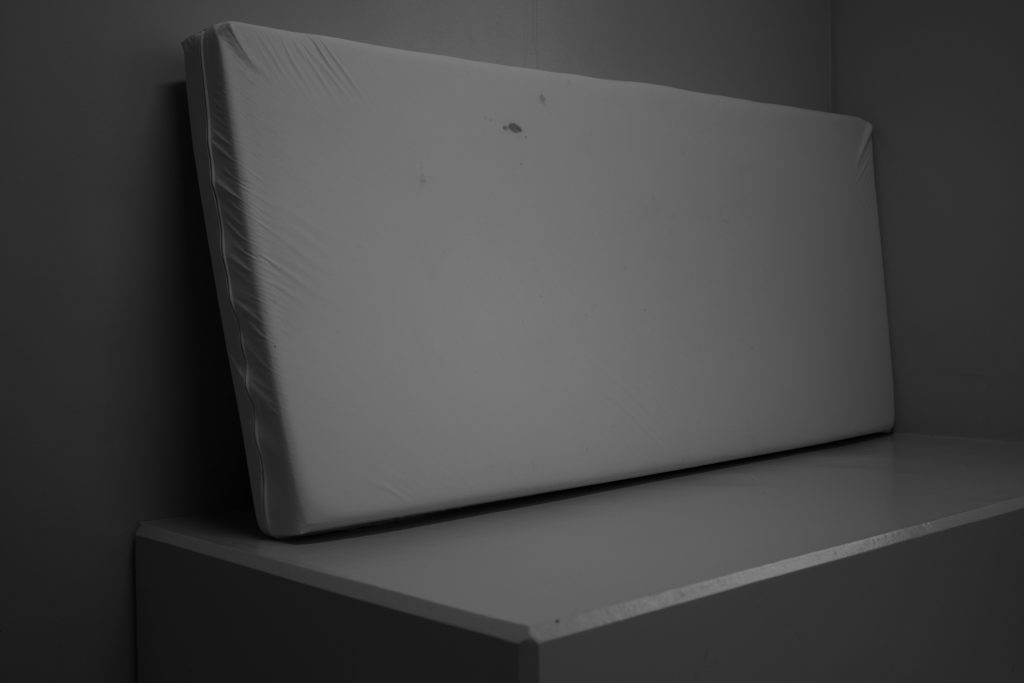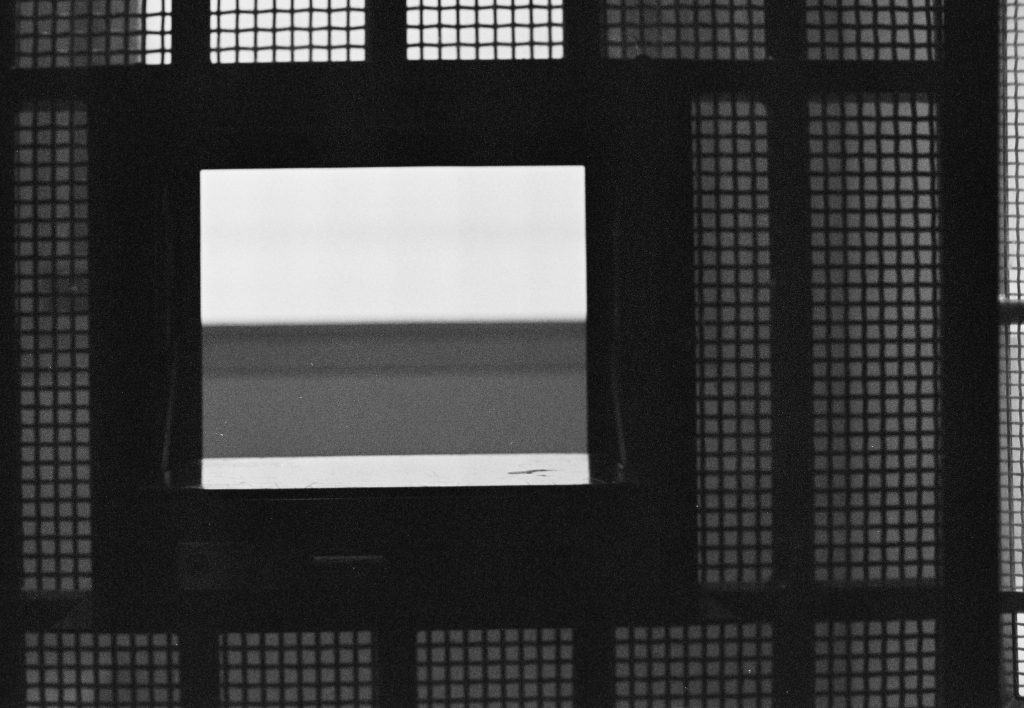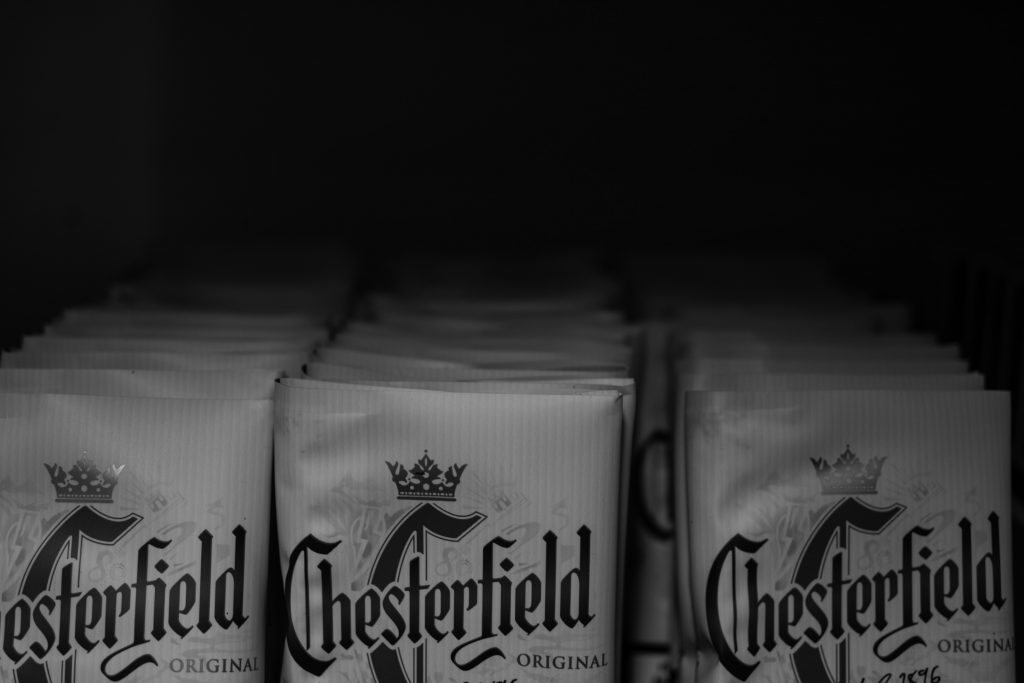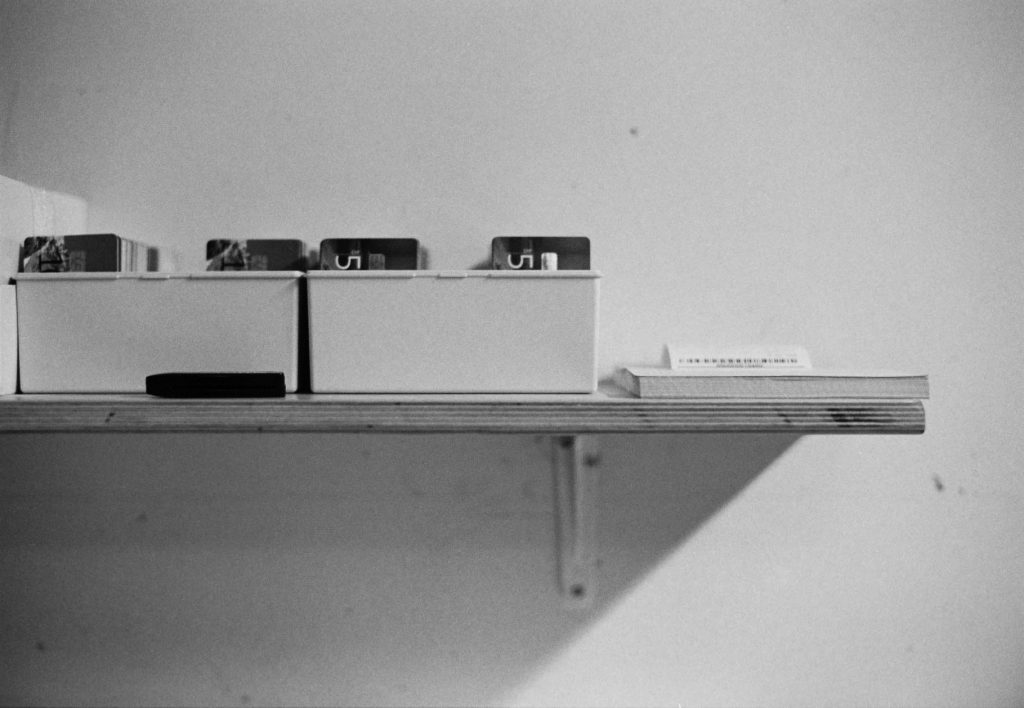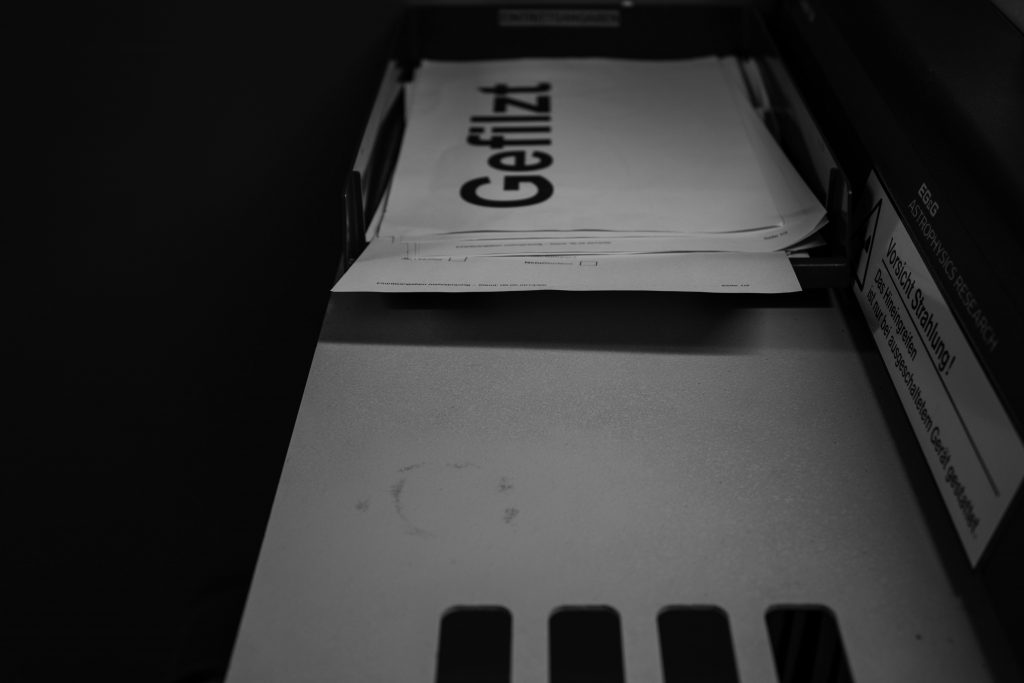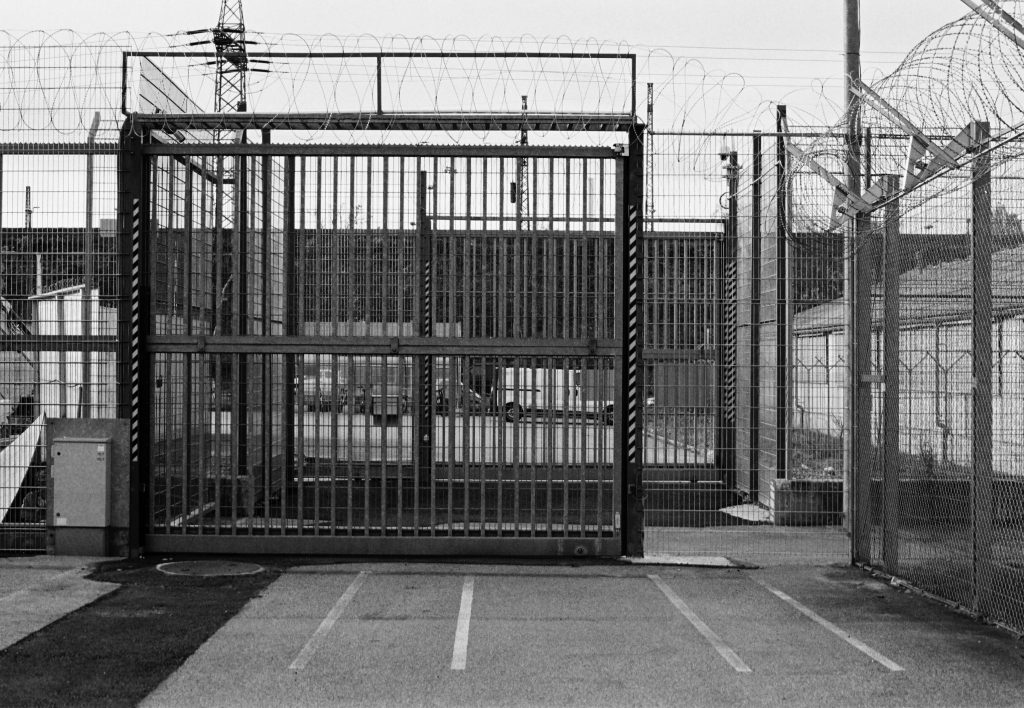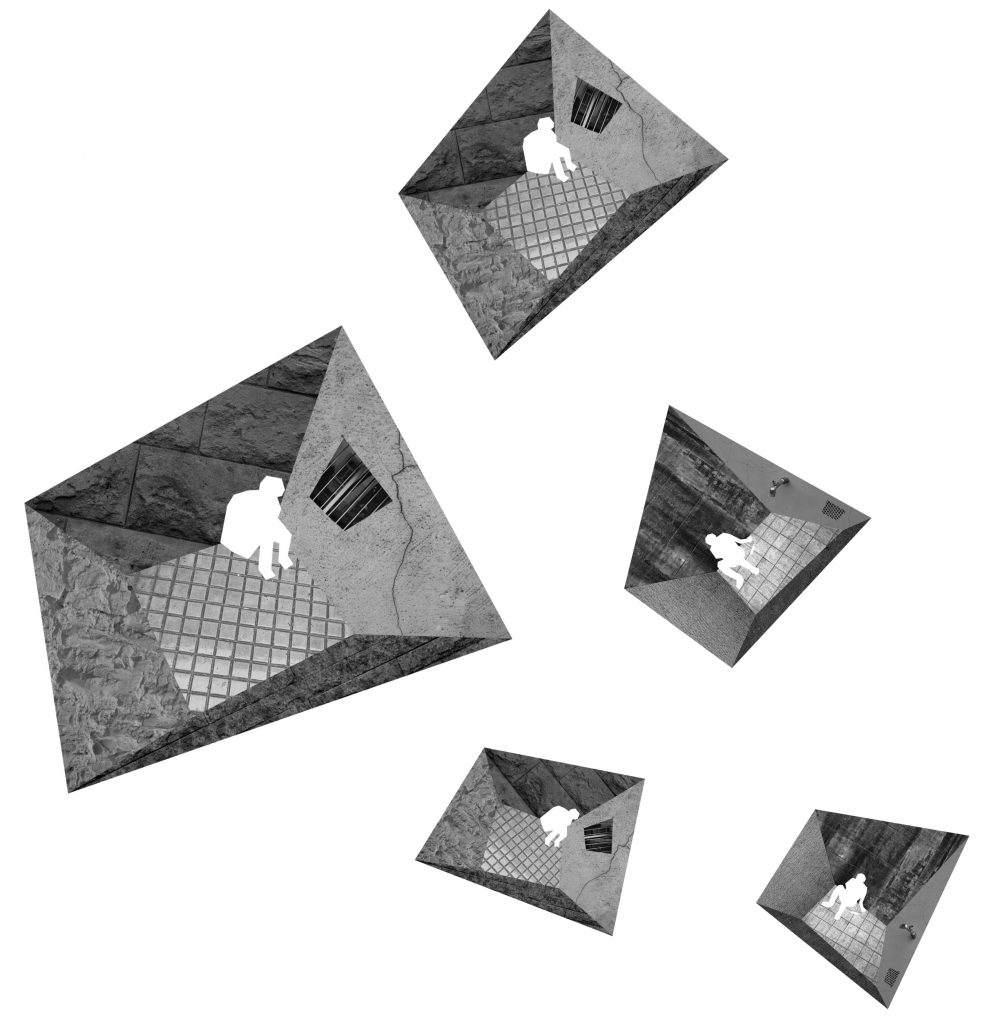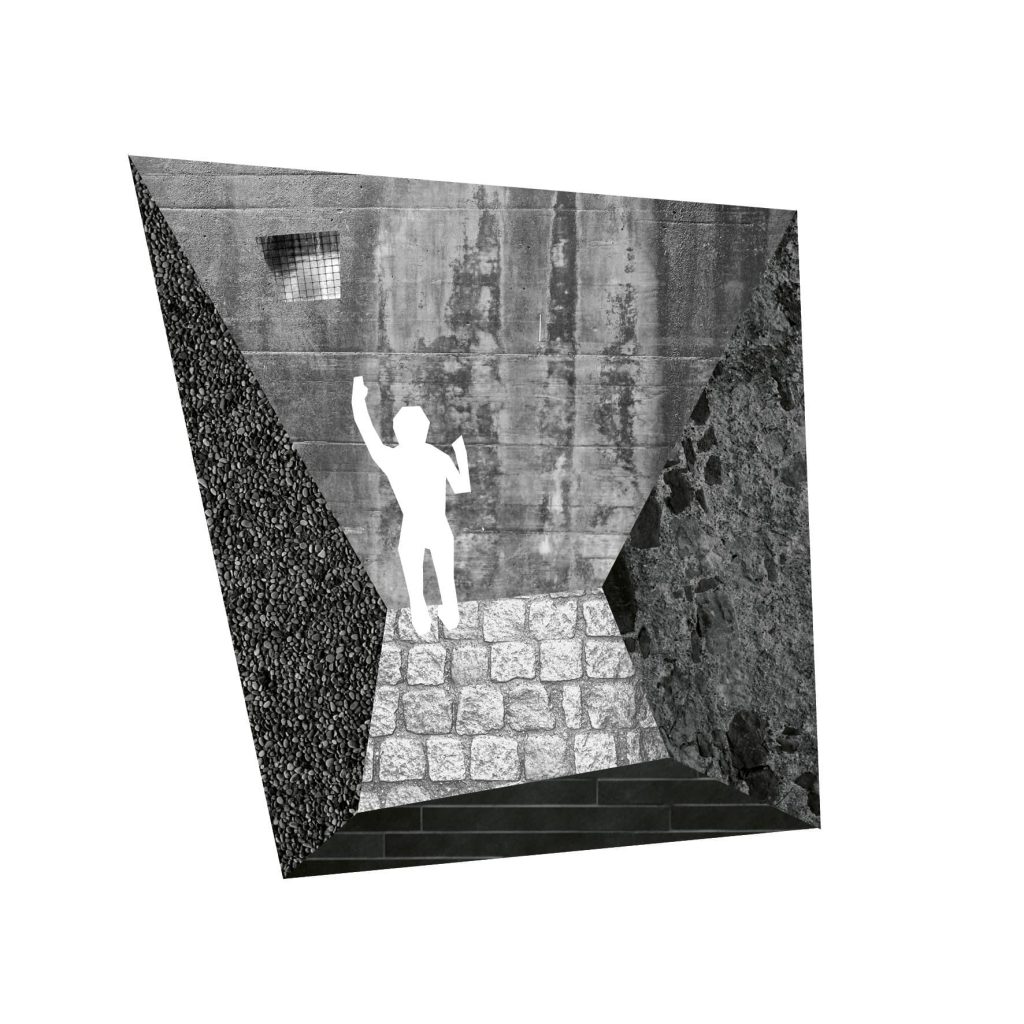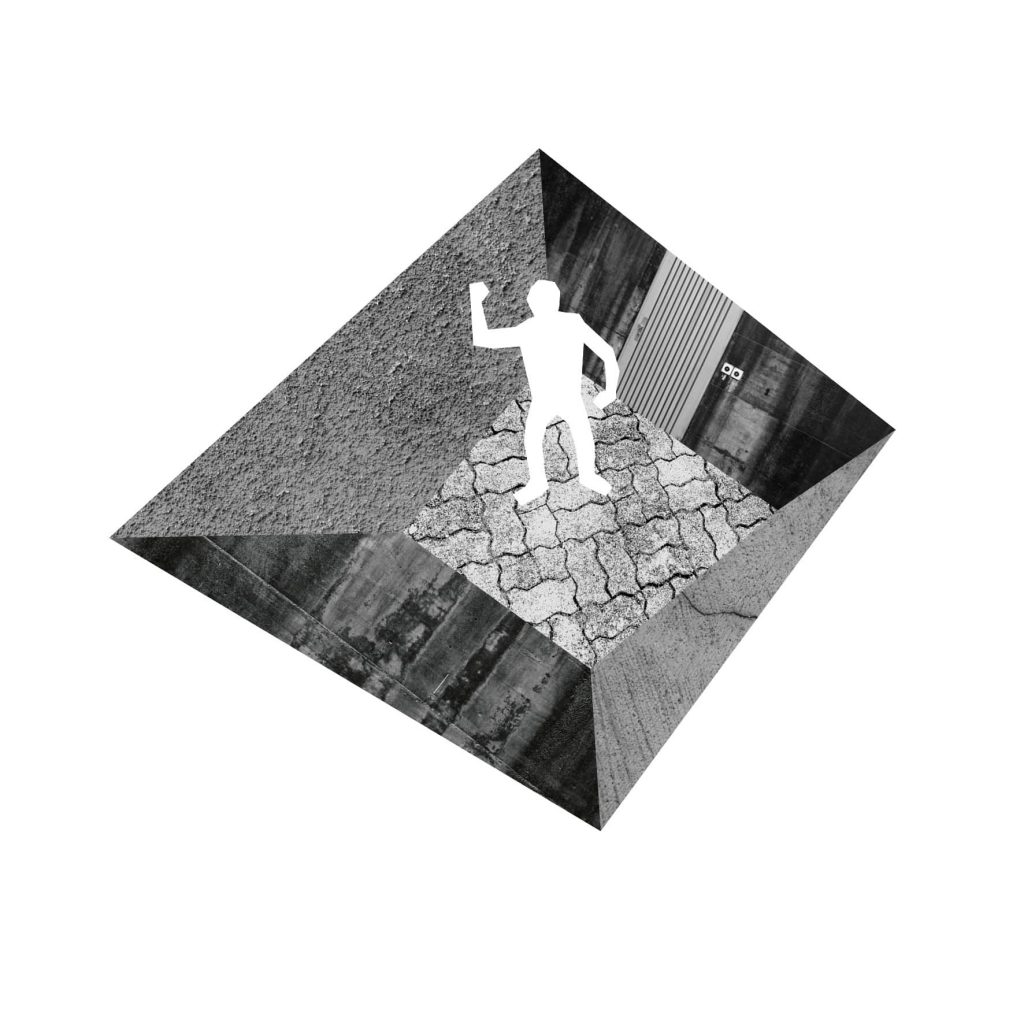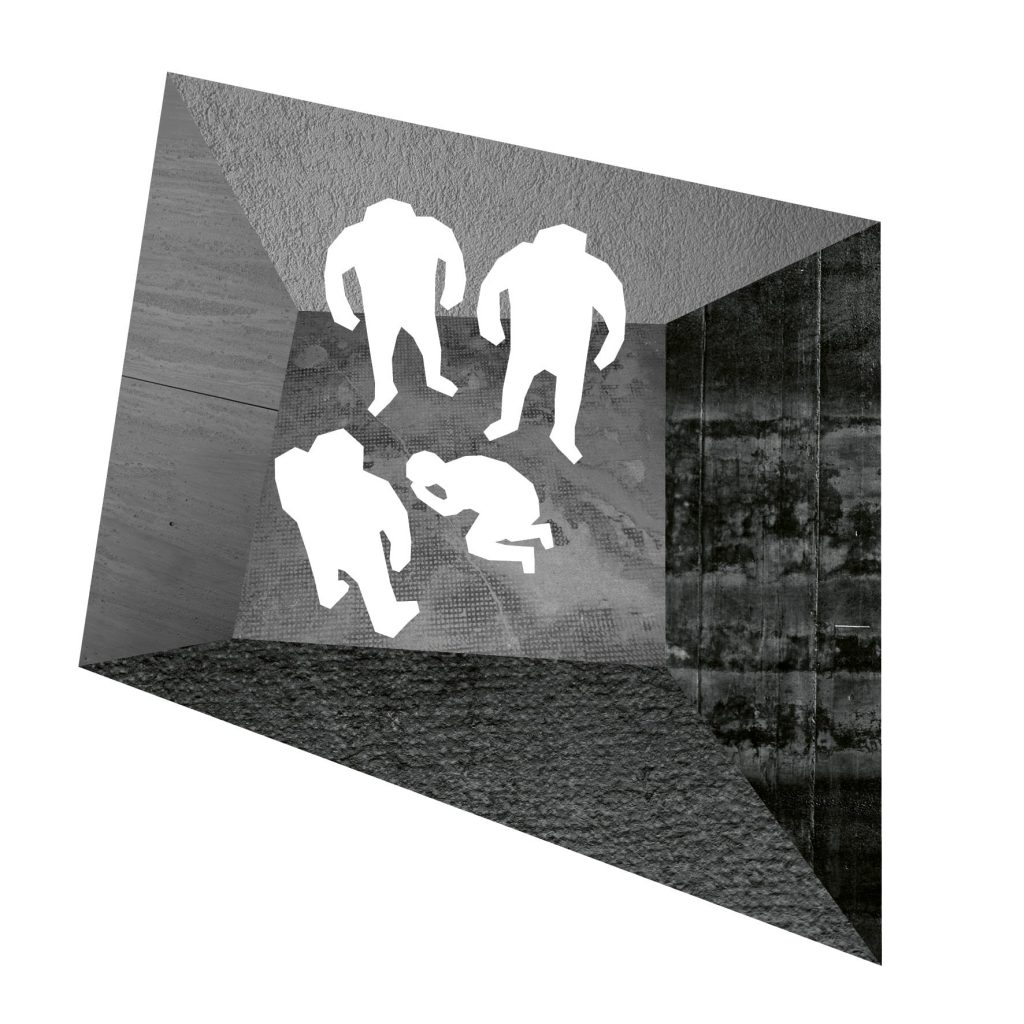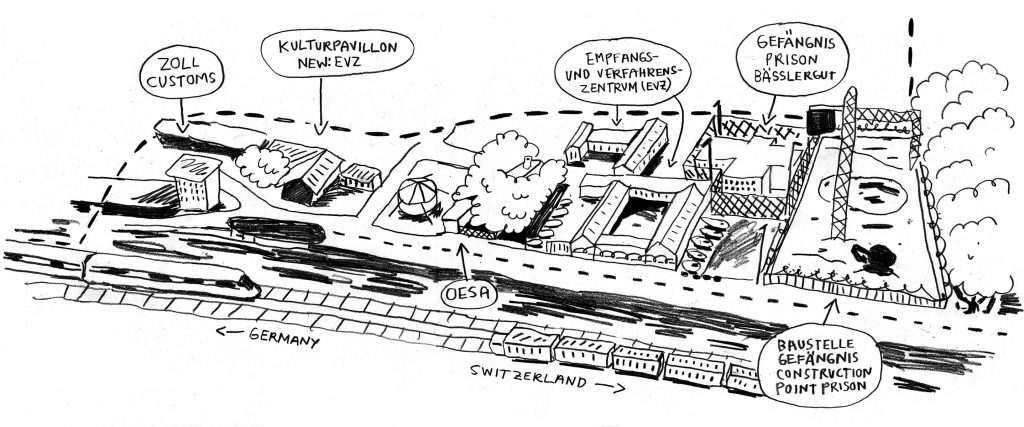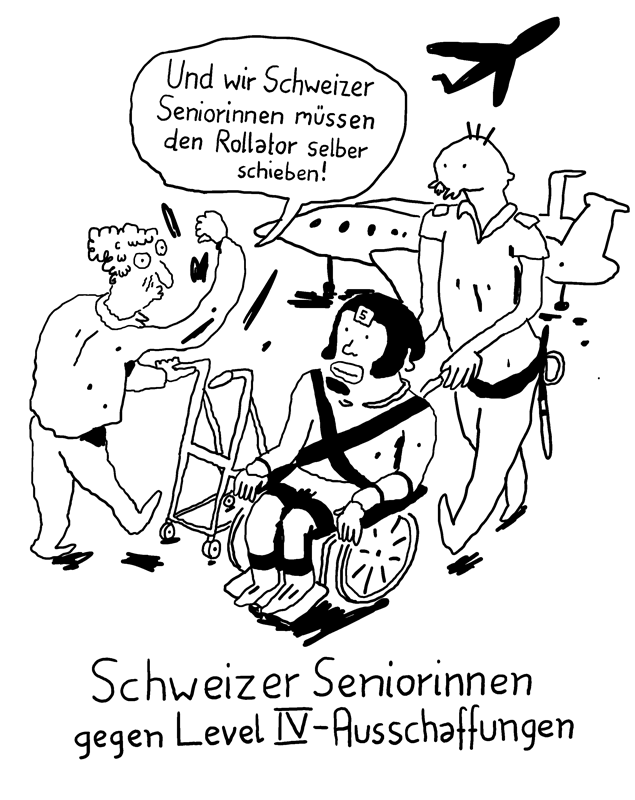The photographs were taken during an official guided tour within the prison Bässlergut. Glances at the reception cell, the production room, the yard, the courtroom, the isolation cell, and the prison’s own kiosk. Then, we are back at the big steel gate separating the two worlds from each other. We were not allowed to take pictures of prisoners or personnel. What remains are empty rooms and the traces of human beings imprisoned.
Category: Deportation Prison
Everyday life in the deportation prison – A conversation in Bässlergut with two detainees
The following interview took place in the Bässlergut deportation prison during the official visiting hours. Standing in front of the large prison gates, we press a red button and via intercom give the names of the people we want to visit. The first door opens; before being allowed through the second we have to wait again; ultimately, we are let in and after a few metres we enter the overheated entrance area of Bässlergut. Take off the winter jacket, hand in the ID-card, deposit our bags, fill in the registration form, go through the turnstile and pass the metal detector. As always, we are taken one-by-one to the visitors’ room where we take our seats and wait until finally, we are five of us at the table. Although we all already know each other, the two detainees we’ll be interviewing are rather mistrustful at first. They show this by not only wanting to know why we wish to interview them but also who we work for and whether we are affiliated to any (political) group or association. The interview is very risky for the two detainees, as they are subject to the capriciousness of the wardens. Recognising this, we would like once again to thank both for allowing us to publish our conversation.
You‘re about to have a level 1 deportation.1 Will you resist this?
B: Yes, I‘m being subjected to a Level 1 deportation. I can’t cope with going through all the levels again and then getting kicked out a third time so violently. No, I really don’t want that. I don’t know, when exactly I will be deported. I will only hear about 2 to 3 days beforehand. It doesn’t bring much to resist anyway; it would only defer the deportation by 2 to 3 weeks.
N: The problem is that we are just seen as foreigners. That we’re also humans gets forgotten.
B: I grew up here and now I‘m being deported and can’t stay with my child. What I really want is to live here, look after my family and see my child grow up! Actually, I never wanted to put kids onto this fucking world. But now I have one and have to leave. I won’t be able to see how he develops, how he eats, speaks or walks for the first time.
What’s your everyday life look like here in Bässlergut?
B: At 7:15 the guards open the door to our cell and at 17:00 it’s closed again. There are three of us living in our cell. We have a TV there. In addition, there’s a common room on our floor with a kitchen and a large table, but only two chairs. It’s not cosy there at all.
N: Being able to go out helps the time pass. Some go out, a few stay inside. Twice a day we can go into the courtyard, once for an hour and once for two hours.
What about the food?
B: Breakfast is at 7:15 and we have something to eat again at 11:00 and at 17:00. Second-helpings are out. Once we asked the guards if we could order a pizza and pay for it ourselves. „Fuck you,“ was the answer.
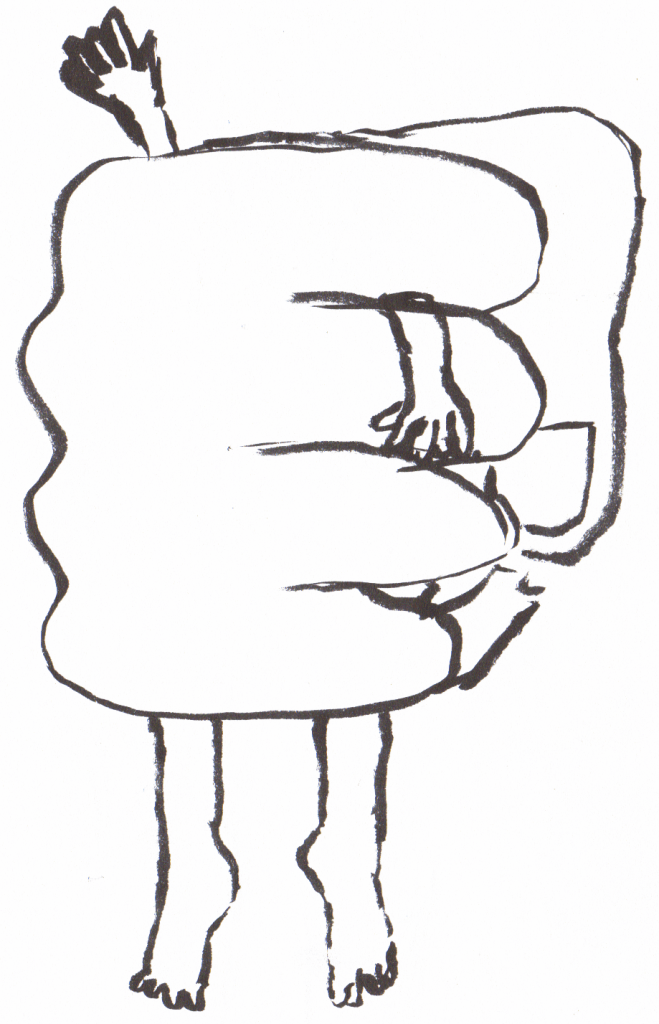 N: A small kiosk is open once a week where we can buy food, drinks, cigarettes and other things. But they are completely overpriced: An M-budget chocolate bar costs about Fr. 2.00.
N: A small kiosk is open once a week where we can buy food, drinks, cigarettes and other things. But they are completely overpriced: An M-budget chocolate bar costs about Fr. 2.00.
B: I work 2½ hours a day and can hardly buy anything with what I earn!
And what about the work?
N: In the evening, the prison wardens come and ask who wants to work the next day. On Monday, Wednesday and Thursday the working hours are from 8:00 to 10:30 and on Tuesday and Friday from 14:00 to 16:30.
B: Two to three people sit at each work-table. We are not allowed to talk. You can only drink water from a tap in the toilet. We’re not allowed to drink water while working.
What sort of work do you do?
B: At the moment, we’re mainly doing things for Christmas, for example, assembling different packages and gluing pieces together. When they’re finished, the packages are then sent to Belgium, where they are filled with various things. From there they go on to China. But I don’t know who the order is for.
N: For the two and a half hours we work we get Fr. 7.50 each.
B: Last week my wife and child came to visit me when I was working. At the reception they asked to see me, but nobody came to tell me that my family was here. So, they left again. When later I found this out later, I asked the guard why he hadn’t informed me. Seeing my wife and child is more important to me than shitty Fr.7.50! „Those are the rules: When you agree to work you have to work.“ was the answer I got.
N: Withdrawing the allowance to work is sometimes used as a form of punishment as this means you aren’t able to earn any money.
Do you work?
B: Yes, I work regularly. But not because of the money. No, the only reason I work is that I sometimes need to get some peace. Otherwise all around me people are always listening to music, talking on the phone or talking to other people. By going to work, I can escape the hubbub for a short period of time.
N: No, I don’t work anymore. Three months ago, I broke a small carton box while working. It was only about as big as an A4-sized page …
B: That can happen; it‘s all happened to all of us some time!
N: … I got bunker-arrest for five days. I haven’t worked since then. I don’t want to risk having to go there again.
Can you tell us something about the bunker? What’s it like?
N: It’s an isolation cell used for solitary confinement. In my case, for breaking a small cardboard box at work. During the time in the bunker I was only allowed to walk in the courtyard once a day and on my own; the rest of the time I spent isolated in a room with a small window and a TV. After five days, I was finally able to return to my cell.
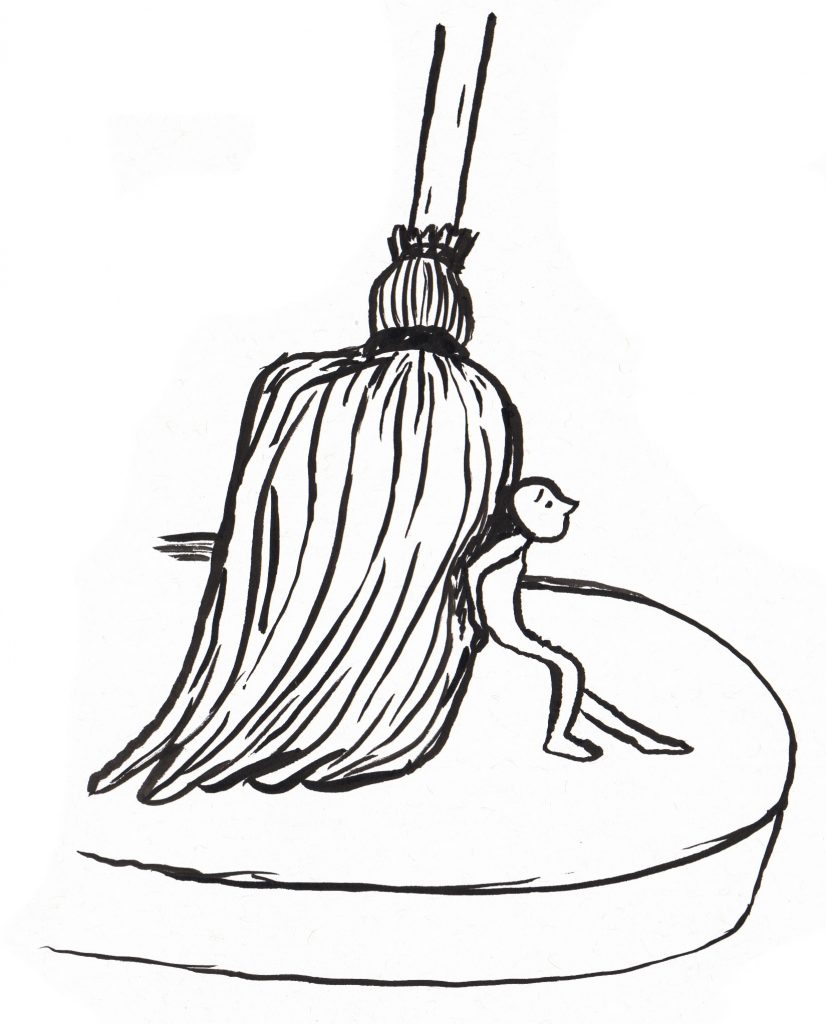 What kind of medical care do you have?
What kind of medical care do you have?
B: There are two doctors you can go to. One is not helpful at all. He treats us aggressively. We speak different languages which often leads to misunderstandings. We are as unimportant to them as we are to the guards. You can tell by how they talk to you and how they deal with you in general. One detainee in our cell swallowed a lot of shampoo once. He had mental problems and hadn’t eaten for a long time, but he smoked like a chimney. Do you think the guards arrived straight away when we called for help? No way, they only got here after three-quarters of an hour, although they could have made it in five minutes. That shows how we aren’t taken seriously here.
N: Two weeks ago, I asked the psychiatrist who treated me two years ago, to come over because I wasn’t well. However, the prison guards told me that this wouldn’t be possible and that I wasn’t even allowed to ask.
Walking past the turnstile to the visitors‘ room, one can see on the right-hand side a cupboard full of various medicines. Do you get the medication you need? And what medicines do you get?
B: Yes, we can get medication. All the medicines we take have already been dissolved in water. It isn’t possible to get medication in the original packaging. I bet there‘s Temesta in it as well. When I asked if I could get my medicine in its original packaging, I was told, „Shut up, you shit foreigner.“ Since then, I have stopped taking medicines because I see what happens to everyone else: either they calm down and sleep or they become aggressive. By the way, the same thing happens after dinner: We all go to sleep afterwards. That‘s not normal! Or do you go to sleep every time you eat? There is certainly some sort of tranquilizer in the food.
How do you get on with each other?
B: We spend most of the time on our own – each of us in our own part of the cell. Everyone tries to cope with their problems by themselves. Especially if someone has been badly treated, then he can become very aggressive. Then it is better to leave him alone for the time being. Added to that, we have difficulties communicating with each other, as we speak so many different languages.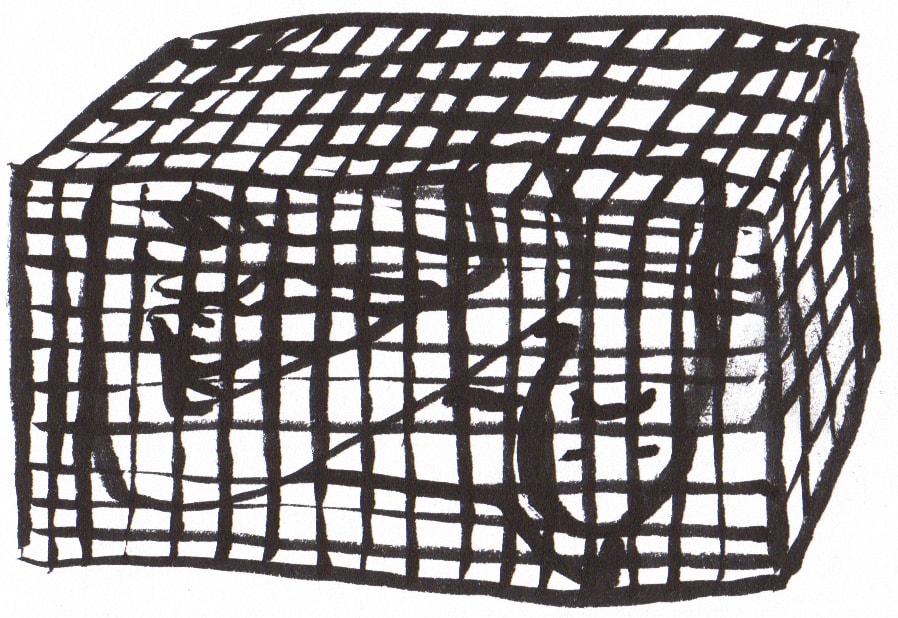
Are there any collective forms of resistance?
B: Once somebody went on a hunger strike for seven days. Then the guards put him in the bunker and gave him some medication. Even in our cell, we’ve thought a few times about going on a joint hunger- or work-strike and we already started planning one once. But there are always a few detainees who don’t want to join in. I can understand that too: If you smoke, you just need to go to work. That‘s why such plans to resist fail.
N: Actually, one could say that the only way to survive here is to try to stay stable. Because they want that: to break us mentally.
Do you feel any solidarity from outside the walls of Bässlergut?
B: No; and, if so, then only through visits from outside. Anyone who doesn’t have any visitors doesn’t feel any solidarity. Once you‘re in jail, you‘re stigmatised, you don’t have any friends any longer. When you‘re in jail, suddenly all your friends are gone and nobody comes to visit you. That‘s the way it is…
Gegen wen richtet sich eure Wut?
N: When I was outside, I didn’t know what the deportation prison is like. Now I‘ve been here for four months. What’s done here to people, doesn’t happen anywhere else. If I ever get out, I’ll come back to Switzerland and demolish this prison. Since being here this has become my goal.
B: As a foreigner, you can do little to change your situation. Even if you‘re born here and have a Swiss passport, you‘ll always be a foreigner. This Blocher, who earns millions every year and stirs up resentment against foreigners. Who works for him? Who cleans his toilet? And he says “shit foreigners”! In this world, the mightier one always wins. That’s reality. Switzerland is said to be neutral. But who supplies weapons to the rest of the world? Switzerland is said to be neutral. But that‘s just not true. Switzerland is a police state. Once the prosecution has decided what’s going to happen to you, it’s closing time. Is your lawyer a member of the SVP? Then it’s closing time. They can offend us foreigners as much and as often as they want. We’re here and just have to shut up.
Prison Sucks – 6 surprising reasons why we should fight prisons
Prisons are socially implicit, they seem unassailable. Throughout the political spectrum, from the left to the right, there is rarely any criticism aimed at this institution. This used to be different, prisons are a modern phenomenon. Here are some ideas which could break through this implicitness.
Even the radical left has been withdrawing their demands in the past decades. While during the 70s- and 80s the „Entknastung“1 (minimising prisons) of society was their focus point, all people dare mentioning today is the disimprisonment of „our“ political prisoners.
Prisons
Prisons have existed since antiquity, but for a long time their function differed from the function of prisons today. People were put in prisons temporarily until the proclamation of the sentence or the execution, similar to today’s imprisonment on remand.2 The punishments were monetary fines, public humiliation like the pillory or banishment, as well as corporal punishment like floggings or death penalty.
Debtor’s prisons were also very common: people were imprisoned until they settled their debts or were able to do so. This has changed: People in debt must serve their fines in prison.
Work and correction houses arose only later, in England. They were for marginalised groups and the poor so they could „improve“. From that point forward, more focus was put on punishment by incarceration as it is considered more humane than public humiliation and corporal punishment. In the 19th as well as the 20th century, there were efforts and movements to reform this system which demanded that prisons become a place for people to better themselves or be converted.
The punishment consequently disappears behind high walls from the public eye through the imprisonment. A complex, systematic correctional system with different levels of incarcerations, from adjustment of penalties, work, leave, to yard exercises and so on.
The idea remains: the body needs to reside within the building and abide by the executive power – frequently appointed by the state.
Reason 1: It creates more problems than it solves
Next to the fact that a prison itself is a form of violence, many detainees become victims of violence by inmates or guards. There might be people incarcerated who are suffering from some form of trauma; it is also very likely that they will live through traumatic experiences in prison. The repressive surroundings, the hierarchical structures and living conditions enhance depression, pathological addictions, power games, and violence to and by the prisoners. For example, the highest drug prices can be found in jail.
It is absurd really that in big prisons „lawfree“ space is created, in which violence, rape, drug-trafficking etc. are on the agenda. Environments are created which make it possible to develop problematic strategies to resolve conflicts such as violence, let alone acting them out and passing them on. A prison is a place where delinquent practices and strategies are dispatched and spread. An underworld exists which hardly anyone knows let alone is interested in. It is, after all, happening behind high walls.
Many young people, who are arrested because of „small“ delinquencies, will get in contact with a environment in which delinquency is reputable and widespread. In certain cases, prison will foster the criminality it promises to fight and will do a lot of harm in doing so.
Reason 2: Society produces „superfluous people“
Prisons are full of people who came into conflict with the law through social inequality and poverty. Most of the sentences are directly or indirectly connected to questions of property. Many prisoners are users of illegal drugs. The prison, the instrument of sovereignty, is not only oppressive but just as productive: people are urged to behave productively and to conform. It is these instruments which constitute us and our society.
Many laws are part of the war against the poor. They are created to stipulate and defend the present order and existing structures (of ownership). The justice system is not as neutral and objective as it seems. What should be pursued and penalised is a political decision which so far has brought absurd dimensions (such as prison for fare evasion). Laws create a class of and legitimise delinquents and a whole apparatus of policemen and women, judges, supervision and control. Prisons, just like schools, barracks, psychiatric institutions, hospitals etc. show the individual their place in society and determine them in that exact position.
Theoretically, one of the goals of incarceration is resocialisation. The individual should take a different, more conforming position in society again. These were the goals of many reforms in the last decades. They seem to have been abandoned by now.
As long as society is as it is – full of social differences, sexism and racism – there will always be people who get into conflict with the law. Society will always produce „superfluous people“.
Reason 3: It should scare us
The simple awareness of prisons and prisoners should serve as deterrents. The fact that you could lose your liberty when breaking the law will make you aspire to conform and be as law abiding as possible. This fear needs to be present in our everyday life as well as our subconscious: The police in your own head. This already helps to prevent the smallest transgressions. Something that is seen as characteristic for pacified countries like Switzerland.
Reason 4: We love freedom
The most blatant deprivation of liberty: prisons are an especially strong form of an in- and exclusion mechanism. Resistance to and criticism of the existing order can quickly lead to imprisonment.
Reason 5: Why punish?
Is punishment a moral idea, an appropriate reaction to offences like theft, violence, or assault? Punishment always means to purposefully make someone suffer. What is the goal of making someone suffer? – The thought of punishment is based on an idea of retaliation and revenge. Delinquents are stigmatised and through this the resocialisation – which should be one of the reasons for prisons – is impeded.
The demands for severer punishments are getting louder. This is a deeply reactionary idea based on the moral concept of retaliation towards those who supposedly refuse to stick to the ruling order.
Reason 6: Sexism and racism
The people in prison are mostly men. The prisons contribute to (re)producing sexuality and gender. While men are more likely to be accused as perpetrators, women are presumed to be insane and are put into psychiatric care. Unfortunately, sexualised and racist violence are on the agenda in both institutions. The state is not able to keep its promise of security, quite the contrary: techniques and institutions like the police, prisons, borders etc. produce violence against women* and people of colour instead of stopping it.
The protection of marginalised communities is used as a pretense to have the police and the judicial system continue to resort to violence. Let us look at the example of the discussions after the incidents during the night of New Year’s Eve 15/16 in Cologne: The violence against women is a widespread and often hidden phenomenon, and is used to legitimise violence against People of Colour, in the country as well as in so-called „EU external frontiers“. If an illegalised person becomes a victim of sexual violence they might not have the possibility to turn to the police. They could experience violence once more: they could be incarcerated and deported.
Community based approaches
So how to feel safe if there were no prisons and the police are of no help?
There are some approaches from queer-feminist circles which have already been applied many times with mixed results. The idea is that the environment of the perpetrator and the environment of the „victim“ can try to find a way to handle the experiences of the „act“ and to understand and work out the consequences. Many of us have certainly done that with small offences, assaults and problems in the social environment. The following principles have been worked out by people who have worked on this topic extensively.3
- Collective support, security and self-determination for the affected people.
- Responsibility and change of habits of the person who used violence.
- Development of the community towards values and practices directed against violence and oppression.
- Structural and political change of the conditions which have made violence possible.
Consequently, the people using violence are offered the possibility to change their behaviour instead of being punished and cast off. It is more about empowering the people affected by the violence instead of just protecting them. The “victim’s” self-determination needs to be reclaimed and they should not just receive protection from the outside as a „powerless“ person. This strategy is at the core of the assumption that the people who have been affected by violence have great knowledge and skills that will make them into potential participants of their own as well as societal change.
This is an entirely different approach than prisons are, which want to sell us security through the safekeeping of danger. This prison-logic tries to isolate a few „rotten apples“. But often there will be good explanations 4, albeit no excuse for violence.
All these approaches are only possible if the people have social environments that are stable enough, and see themselves able to act and intervene in a violent situation. To make this possible for all people we most likely need to live in a different world. The reasons for a fight against prisons do not only have to do with criminal justice and the state but are also questions about an emancipated and just world.
A person who in the last few years has started to engage in the topic of deportation and the deportation prison „Bässlergut“, has developed a fundamental critique of the institution. This person cannot understand, why resistance against the expansion of prisons has never led to a discussion of sense, nonsense, and necessity of the institution of incarceration. This text is based on an input given in the fall of 2017 at the „Bässlergut-Wochenende“ at bblackboxx.
«I don’t expect anything much from life anymore»
Fahim sits in front of us and nods his head in a friendly way. We take this to mean we can start the interview. The young man doesn’t seem to care too much about what we do in our lives, how we make our money or if we belong to an organisation. Fahim tells us he has been in the deportation prison Bässlergut for some months now pending deportation. Before this he had spent several years in various other prisons – firstly in a juvenile detention centre and then in adult prisons. He says he has been in prison for far too long and is sure he must have more than finished his sentence by now.
When asked how the everyday life in an ordinary prison differs from that in a deportation centre like Bässlergut, he names the opportunity to work. In prison Fahim was responsible together with eight other inmates for preparing lunch and dinner for 140 people.
It was a strenuous job, and in the evening, I knew how hard I had worked.
For the 6½ hours a day that he worked, Fahim received 22 Swiss francs. He managed to save some money so that he doesn’t now have to work in Bässlergut.
Conditions in the deportation prison
Fahim tells us that the inmates in Bässlergut get on well with each other in general, even if communication is difficult, as most speak either English, French or Arabic but not German. He spends most of his time sleeping and doesn’t have much to do with the other prisoners or the wardens. He only sees the latter when he gets medication (for his gastric acid reflux), a shaver or food. Otherwise he’s by himself a lot. Until recently Fahim shared the cell with another inmate, but now he has been deported, Fahim has the cell to himself.
That doesn’t matter to me. On the contrary. I prefer to be alone. I don’t care what the mood in the prison is or how the others are doing. I’ve had enough of it all.
Ten people are currently detained in Fahim’s wing of the centre and all should be deported as soon as possible. The wing has single, two-, four- and eight-person cells, as well as a common-room with table football, a kettle for making tea, a table and three chairs.
Just yesterday an observation camera was installed in the common-room. Probably because some inmates smoked cigarettes while playing table football.
Unlike prison, the food here is awful, Fahim tells us. “Sometimes there is only soup and a piece of bread in the evening”. Everyone eats on their own in their cell.
Impending deportation
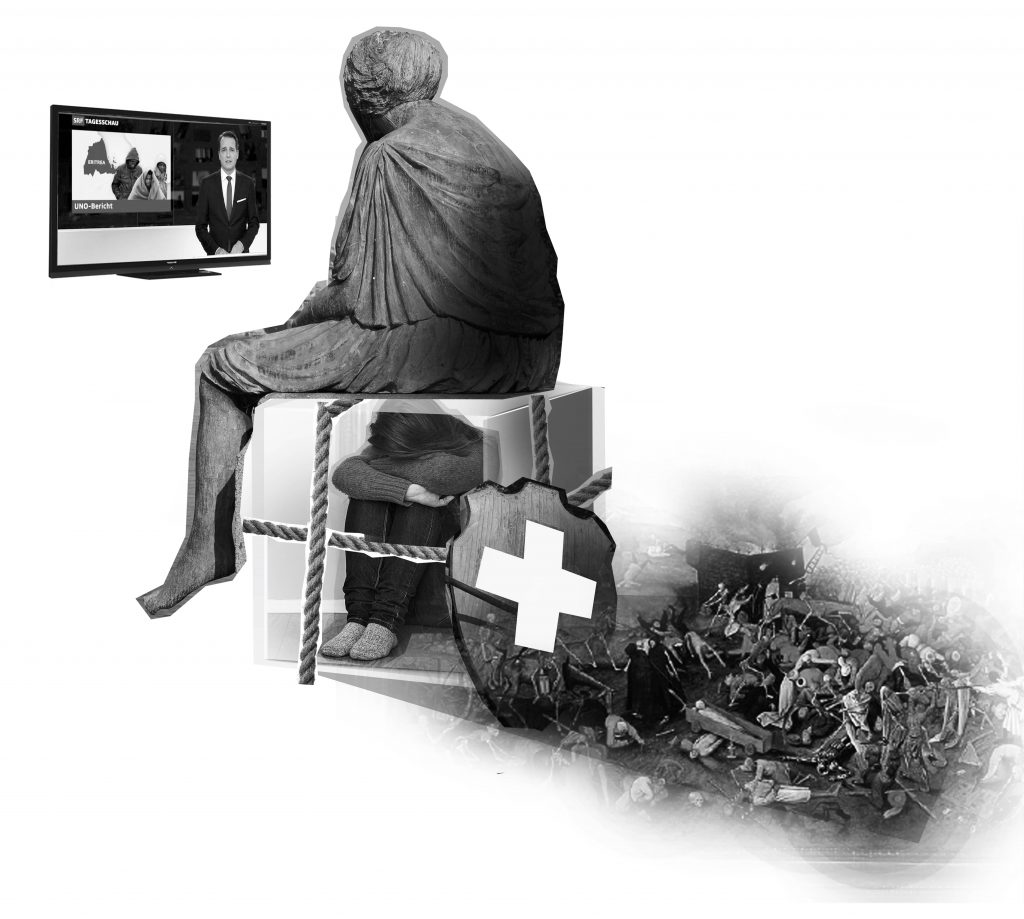 The first time Fahim heard that he was going to be deported was in a letter. This listed his crimes and the grounds for the deportation. Although Fahim put the letter aside, he tells us, he never forgot it. In fact, he always believed that he would be freed after having served his sentence. He received the letter at a time when he was on the run, having absconded from an open prison. But after a few months he turned himself in to the police. Because he had absconded he wasn’t allowed to return to an open prison but had to go to a detention centre instead, where he spent a further year.
The first time Fahim heard that he was going to be deported was in a letter. This listed his crimes and the grounds for the deportation. Although Fahim put the letter aside, he tells us, he never forgot it. In fact, he always believed that he would be freed after having served his sentence. He received the letter at a time when he was on the run, having absconded from an open prison. But after a few months he turned himself in to the police. Because he had absconded he wasn’t allowed to return to an open prison but had to go to a detention centre instead, where he spent a further year.
At the detention centre you‘re in your cell for 23 hours a day and are only allowed out for one hour. It wasn’t until I wrote to the authorities that I was allowed to leave the detention centre.
Why he had to stay in the detention centre for such a long time, he still can’t explain. After the detention centre and following his trial Fahim spent a further two years and nine months in prison.
The authorities there are the worst when it comes to applying for early release on grounds of good behaviour or for holiday permits. I was neither granted leave, nor was I released early for good conduct. But that didn’t just happen to me, it was the same for most of the others too.
Two weeks before his release, he was told that he would be moved to Bässlergut in order to prepare for his deportation. Ever since then, Fahim has been fighting to be released, but a request to the Court of Appeal for discharge was denied. Although Fahim – as he tells us – hasn’t entirely given up hope, it’s diminishing day-by-day. Asked what he would do if he were actually released, Fahim says he would go to Sri Lanka for up to three months.
After that I would return to Europe, either to Germany or Austria, where I would have to stay at least five years before I could enter Switzerland again.
He tells us that he already has contacts in Austria. He knows a boxing club there and has already sent them videos of him boxing. The club would like to take him and would help him look for a job.
Prison & deportation as seen by Fahim
For Fahim a B-permit means much the same as an F- or C-permit. His younger brother and his father both have a C-permit; his mother a B-permit. Why his mother hasn’t got a C-permit despite being employed and having lived long in Switzerland, he doesn’t know. Like him, his older brother is in custody and is also threatened with deportation. Five years ago, a friend of his was deported to the Ivory Coast. „He’s in bad shape there, because all his relatives are in Switzerland“. Fahim thinks that a prison sentence may sometimes make sense, especially if it can help you gain an insight into your behaviour. When we ask Fahim if he would have given himself a prison sentence, he replies,
I have committed many crimes; even the police don’t know about many of them. Altogether, I think 4½ years in prison are warranted. Somehow or other I’ve earned such a long prison term.
However, he finds it difficult to accept that, after having served his prison sentence, someone should then be deported. He cannot understand how one can take everything – even family and friends – away from a person. Furthermore, he finds it absurd to invest a lot of money in integrating somebody into society, only to subsequently deport him. Fahim points out that he has changed a lot over the years and learned a great deal, but this doesn’t seem to interest the authorities. Although he has been living in Switzerland for 17 years and has no ties to Sri Lanka, he should be deported there.
I’ve paid my debt to society, served my sentence in prison. Now I am waiting for a miracle.
Politics and perspectives
Before he went to prison Fahim hadn’t thought much about prisons or deportation. „As long as you don’t have anything to do with them, the whole thing seems far away“. Fahim doesn’t know whether in the future he wants to fight against repressive measures such as imprisonment or deportation. He assumes that people would then point a finger at him and call him a criminal. To go to a demo would take a lot of courage for him, as they often end up with a confrontation with the police. His friends aren’t politically active either.
When I‘m released, I don’t want to do anything but work, box and spend time with my family. I don’t expect anything great from life anymore.
This article is based on a conversation the authors held with Fahim. For Fahim it was important that the article covered everything that we talked about and not just focus on one main point. Before the interview Fahim was offered the opportunity to narrate freely, but he preferred to answer questions which the authors had prepared in advance. The authors of this article have been arguing against Bässlergut for a long time. Their fundamental criticism of the prison is based on their rejection of the rule of one over others.
WEek END BÄSSLERGUT
Since the beginning of the year the deportation prison Bässlergut, at the Otterbach border in Basel, is being enlarged with a second building. With a discusion weekend from the 6th to the 8th of October 2017, taking place around the Bblackboxx, right next to the construction site of the new building, we wanted to share our criticism about this project with as many people as possible.
We wanted to exchange thoughts on these relations, our utopias and ways to resist. At the same time being present at this site should become part of the resistance against prisons, borders and repression. The event was organized by individuals who had been involved in these topics already an found together through it.
Diverse critics on the conditions that manifest in Bässlergut
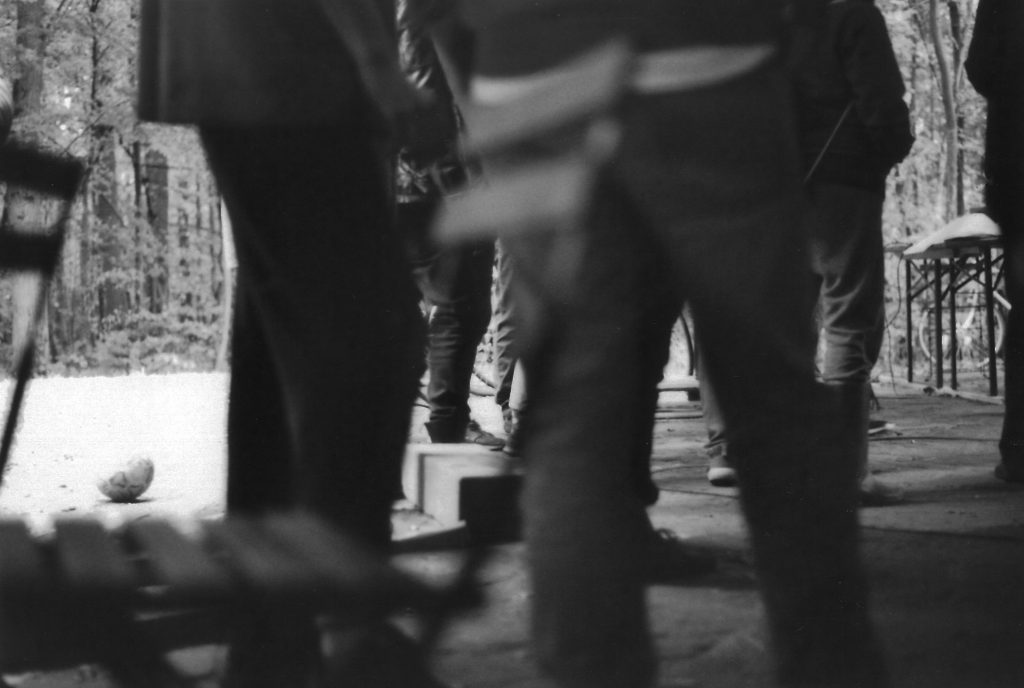 The program started on Friday evening with a well attended NO-Lager-tour around the reception- and processing-center (Empfangs- und Verfahrenszentrum EVZ) the already present deportation-prison Bässlergut I and the construstion site of Bässlergut II. The knowledge of the day-to-day conditions behind these walls that had been collected in conversation with detainees was shared. This was followed by an input on the developments and relationships between the asylum- and justice system. This input made clear that the new building Bässlergut II is an expression of a development which will lead to a future where more migrants and destitute people will be imprisoned – who often are the same, going back and forth from deportation prison to penal prison in the new building.
The program started on Friday evening with a well attended NO-Lager-tour around the reception- and processing-center (Empfangs- und Verfahrenszentrum EVZ) the already present deportation-prison Bässlergut I and the construstion site of Bässlergut II. The knowledge of the day-to-day conditions behind these walls that had been collected in conversation with detainees was shared. This was followed by an input on the developments and relationships between the asylum- and justice system. This input made clear that the new building Bässlergut II is an expression of a development which will lead to a future where more migrants and destitute people will be imprisoned – who often are the same, going back and forth from deportation prison to penal prison in the new building.
With a general criticism of the prison as an institution throughout the last 200 years the Saturday session was opened. In small groups the subjective sense of security was discussed. It became apparent that a strong sense of social security in ones circle of friends or in political contexts was important. Whereas the structural security e.g. having a Swiss passport and the privileges that come with it played a less important role. Can one fear starvation when one has never starved? One of the participants described their privileges also as dependencies that can be withdrawn when one doesn‘t stick to the rules of the game (freedom of movement, various social services).
Through the initiative of a group of people who regularly visit prisoners in Bässlergut and prisoners themselves, a visit to the inmates took place to show solidarity. For a lot of the participants this was a new and important experience. And also the inmates were happy about this support. A regular visitor of Bässlergut prisoners said that he had never seen as many people in the visiting room of the prison before. This collective visit has led to organized, monthly visits (Agenda, S.70). Parallel to the prison visit, an introduction in the historical development of the idea and practice of custody was given. Under this term in Switzerland there exists a years long or lifelong imprisonment that can be ordered by psychiatrists with the help of computer programs. The discussion that followed in small groups was dedicated to the question of how a helpful practice (in solidarity) with mentally ill people should look like. A central point of the discussion was the criticism that psychiatric clinics dehumanize and try to “normalize” patients as well as the lack of knowledge and discomfort when dealing with mentally ill people in ones environment. To be able to help those affected by mental illness, one needs specialized knowledge and a social environment sensitive to their needs.
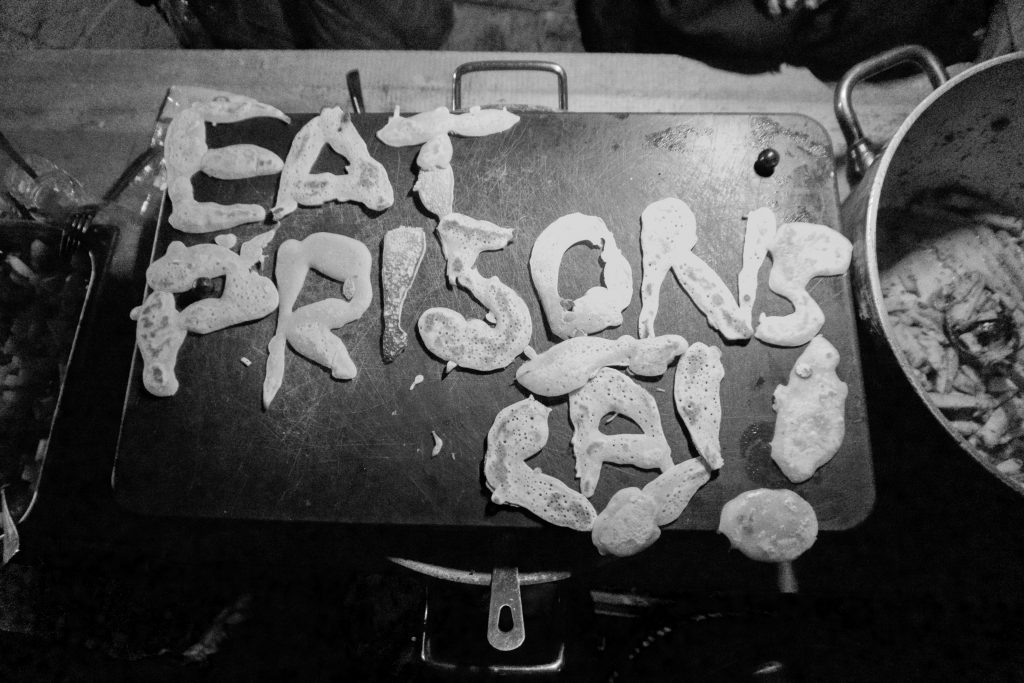 Later in the afternoon a brief story was told of how prisons in the U.S.A are currently being privatized. Prisons have become a lucrative business for private companies. Various international companies (including European ones) compete on this market, doing lobby work to establish more restrictive laws, exploiting prisoners as a cheap workforce.
Later in the afternoon a brief story was told of how prisons in the U.S.A are currently being privatized. Prisons have become a lucrative business for private companies. Various international companies (including European ones) compete on this market, doing lobby work to establish more restrictive laws, exploiting prisoners as a cheap workforce.
The day ended with a film-screening by Kino Vagabund: Fragments of “Vol spécial” by Fernand Melgar and the short movie “Einspruch VI” by Rolando Colla. After the two movies, a controversial discussion began: Are consternation and identification with the victims of the deportation regime the right conditions for a political fight? Are the films demonstrating structural relations and taking a clear position to these? And, what use is it to watch, when one should spring into action?
On Sunday morning, a migrant without papers explained his way through the Swiss camps, prisons and psychiatries and how he ended up in a political environment, fighting for his own rights. He then described how an active resistance against the present system and the practice and exchange with like-minded people allowed him to have a long-term perspective in Switzerland.
Early in the afternoon, questions of privileges, guilt and solidarity were being defined and discussed in a workshop. One person without papers, that had been arrested for several months, said, that to him, visits in prison were a strong gesture of solidarity. At the same time he criticized that in Switzerland the equalization of the terms solidarity with the terms charity and charitable work is often being made. In some groups, there were also discussions about whether or not privileged people should use their privileges in a fight based on solidarity. This could be dangerous: It could reproduce the structures that generate these privileges. Another option would be to fully refuse structures that produce privileges, but this goes with a loss of possibilities to support others.
Food for thoughts about resistance
Our critical presence close to the new prison Bässlergut II, the deportation prison Bässlergut I and the EVZ was creating a form of resistance. There were many lively discussions, in which different topics were treated and critically examined. The presentations filled with interesting content and the broad spectrum of critique showed many structures and practices that need to be fought. It remained difficult to find ways how to translate this knowledge and exchange into a practice of resistance. In this way the weekend was raising indeed the wish to act, but didn’t really open up new perspectives of action. Instead it left some participants with a feeling of powerlessness. The question how and where shared knowledge can be transformed into a practice could have more importance in the planning of a further event like this one.
Several directly affected people insisted on the fact, that authentic and effective resistance requires a bigger willingness for actions that question also the life of one’s own and bring about risks (like money or prison sentences or the loss of privileges). Maybe it is indeed true, that people who are not yet living in a perilous situation, should take resistance more seriously and don’t let themselves stop by the risks that come along with it.
What use is it to watch, when one should spring into action?
During the mobilization process for the event we were often confronted with superficial questions about the deportation policy, but during the weekend the discussions were almost exclusively lead in a principal anti-capitalist mindset. The predominant discourse in this society on deportation policy in the style of “it is indeed a human tragedy, but nonetheless not all of them can come here” was not an issue during the weekend. This is on the one hand a comfortable basis for deeper discussions, on the other hand it can make us forget, how much every kind of alternative to the current migration regime requires a fundamental change of this society and can only be understood on this basis. If migration policy should change, the whole political and economical system must change, which also implicates a fundamental change of society.
Commonalities and exclusions
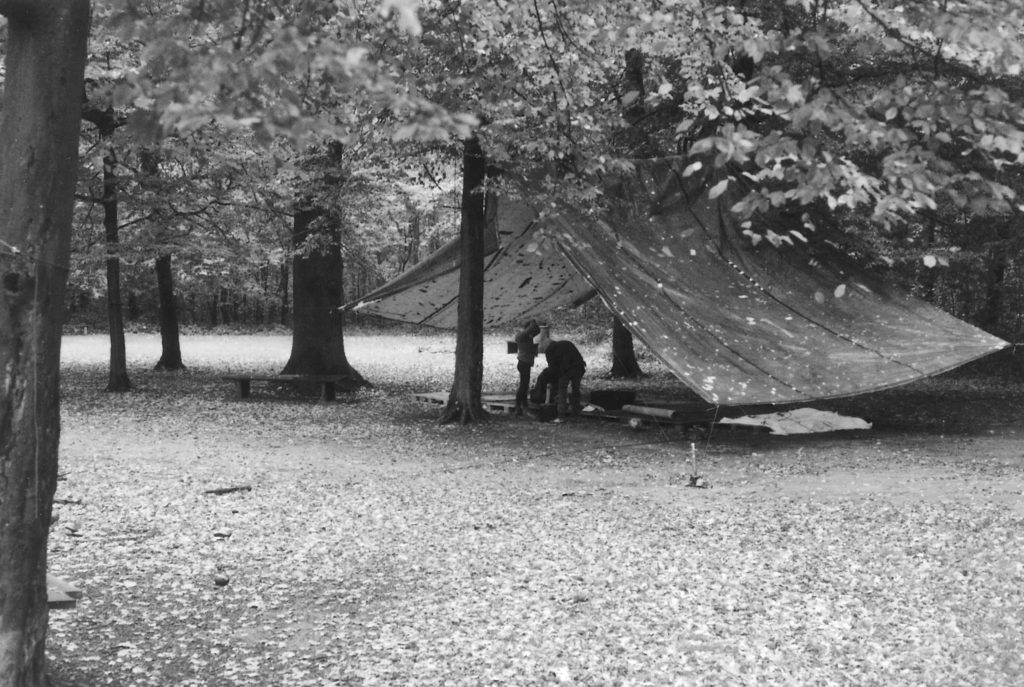 With around two hundred participants despite the cold and rainy weather, the event was quite well attended. People from the EVZ were present, although they were not participating much at the different activities, even tough they have been informed beforehand about the topics and possibilities of translations. The question arises if the framework of presentations with discussions is suitable for an exchange like this. Anyway, thanks to the excellent and permanent food supply the breaks were used to eat together and have more discussions in small groups.
With around two hundred participants despite the cold and rainy weather, the event was quite well attended. People from the EVZ were present, although they were not participating much at the different activities, even tough they have been informed beforehand about the topics and possibilities of translations. The question arises if the framework of presentations with discussions is suitable for an exchange like this. Anyway, thanks to the excellent and permanent food supply the breaks were used to eat together and have more discussions in small groups.
Despite the spicy topic, the police appeared only two times openly on the spot. But still the repression had its effects on the weekend. Some interested people were on the other side of the prison walls and some others didn’t dare to attend the event because of the danger of prosecution and arrest.
Outlook
On the 30th of October there was a further meeting at which the discussions focused more on perspectives and possibilities of resistance. At this meeting the necessity of a long term, open and transparent organization as well as the direct intervention in the public discourse and conditions became evident. Regular public exchange meeting are planned. And also other kinds of actions and discussions (like the collective visits in the prison Bässlergut I since the weekend) continue in a public way.
The construction of Bässlergut II continues until 2019 and probably the conditions materialised by it will persist beyond this date. An infrastructure that is being built, will be used in consequence. The joined resistance in discussions and actions against it remains a necissity!
The expansion of Bässlergut
The Bässlergut Penal and Deportation Prison is being expanded with a second building. The new building will provide 78 places for regular punishment, which means that the “old” building will now have 73 places for pre-deportation detention. With the expansion of Bässlergut, the current developments of increasing control, surveillance, and the categorization of people are demonstrated.
The history of Bässlergut
Bässlergut Prison was named after the Bässler family, which until 1962 farmed the estate as farmyard Otterbach. After the land was purchased by the state, a reception center for asylum seekers was established in 1972 and in the year 2000, the present-day Bässlergut deportation prison with 48 prison cells. As a result, the history of the Bässlergut property is relatively young and should be understood here as a product of a policy that excludes and criminalizes people who don’t conform to the norm. This is evident in the growing political will of Switzerland to categorize people -in this case migrants- more consistently into desired (useful) and undesirable (useless) people and to quickly get rid of the latter. This categorization of migrants went together with their criminalization, which was pushed forward with the 1994 Foreigner’s Statute (Ausländergesetzrevision 1994). At that time, a majority of the voting population advocated the integration of the coercive measures found in the Foreigner’s Act, which legalized imprisonment as a preparation for deportation (administrative detention). This development has been driven not only in Switzerland, but also internationally. Thus, readmission agreements have strengthened cross-border cooperation in the fight against people without permits.1 While the legal foundations for the expansion of imprisonment was created, so was the bureaucratic burden of conducting the implementation of expulsions. As a result, the preparatory period lasted longer, while the political agenda also increased the number of people to be deported.
The places reserved in the prisons for deportations – ‘Schallenmätteli’ for men and ‘Waaghof’ for women – were no longer suited for the new situation: new places had to be created. These demands for the expansion of the prisons were associated with the (spatial) devision of prisoners. Since people in deportation prison are in administrative detention (so not deprived of freedom due to a crime), the conditions of detention should differ from those in prison or pre-trial detention, according to the reasoning. In order to make this distinction between prisoners, the construction of separate prisons was suitable. Even when in reality the conditions of imprisonment hardly differ, (see below) this critique of deportation prisons was used to legitimize new prisons.2 Nevertheless, in 2011, there was a change in the use of a station for a regular prison sentence in Bässlergut I, due to a lack of space in the Waaghof prison. In 2012 and 2013, an additio- nal station was put into operation. Since then, Bässlergut I has accommodated 30 prisoners in pre-deportation detention and 43 prisoners in the ‘criminal’ prison. At the same time, the current reception and procedural center (Empfangs – und Verfahrenszentrum (EVZ), which offers space for up to 500 people, was opened from the original receiving center for asylum seekers. These two developments were accompanied by increased privatization. In both places, the private company Securitas is responsible for security. In the EVZ, the Austrian company ORS is also experimenting with profitorial support. In prison, the inmates worked for 6.50CHF/2h for private companies in de facto forced labor for pro t. Since the Spring of 2017, the expansion of Bässlergut has been under construction, providing space for 78 more prisoners and will be operational by the end of 2020. The current penal places will then be used again for the purpose of deportation, whereby the separation and categorization of the prisoners is again respected. Consequently, new prison cells are currently being developed which will have to be filled with humans in the future and further de ne the repressive developments of the last two decades.
Camp with special laws
In the context of the Asylum Reform 2016, the EVZ will be converted into a federal camp in the future. In Switzerland, 16 federal camps are planned with space for 5,000 people. A distinction is made between procedures, departure, and special centers. In the departure center, deportation is prepared, with at least 100 days planned and mostly concerns people who are to be deported to other European countries under the Dublin Agreement. The 2 planned, special centers are specifically for so-called ‘renegade’ asylum seekers, whereby it remains undefined from which unadjusted behavior is regarded as unruly. In processing centers, surveys, legal counseling, return counseling, as well as accommodation and employment of migrants is managed. The time of these procedures is to be broken down to 140 days, thus reducing the timespan for complaints from 30 days to 10 days.3 The concentration of asylum seekers anchored to the Asylum Law Revision 2016 should make the handling of future applications “efficient, cost-efficient, and fair” (Federal Council of Switzerland).4 This efficiency that is spoken of, means in reality that migrants will be concentrated and isolated in a camp. Through the acceleration of the procedures, the categorization of migrants into desired and undesired is implemented in a more radical and reckless way. For it will be more dif cult to meet the criteria, as well as to resist a decision. Additionally, readmission agreements with third countries will be linked to economic agreements (see Fiasko Nr. 1/2017), which will allow forced deportation from Bässlergut I to be carried out more smoothly. The second point of the more favorable procedures is to be achieved by the centralization of personnel and infrastructure. For migrants in the process, this means everyday life spent within the camp. This practical limitation is additionally reinforced by barbed wire, surveillance cameras and exit controls. The spatial proximity of the various buildings also reflects the reality: from the processing center directly to the neighbouring deportation prison, from the Prison II because of illegal residence via a builtin corridor directly into Bässlergut I. In order to implement the last core criteria of the “fair” reforms, so-called independent jurists were highlighted. The fact that their independence is doubtful has already been stated several times. The short appeal periods, the proximity of the lawyers to the workers of the immigration of ce, and lump payments are only a few critical factors.5 However, what is rarely addressed is the basic context
Beginning with the mere existence of a ‘foreigner’s law.’ A law which has existed since 1934 and is directed only at a specific social group. It is therefore in its existence racist and exclusive. Just like other parts of Swiss law, it is created to protect the privileges of individuals and their property. If one speaks of the rights of migrants, they are always granted only if an economic bene t can be drawn from it, or if Switzerland wants to maintain the image of a nation in which human rights are unconditionally adhered to. We refer here to a frequent objection, namely, that human rights are also taken into account in the asylum system. In reality, it is much more their instrumentalization. Thus, NGOs such as the Swiss Refugee Aid, Caritas Switzerland, Amnesty International, the Salvation Army, HEKS, Schweizerische Arbeitshilfswerk SAH, and the Organization of Swiss Jewish Welfare (Der Verband Schweizerischer Jüdischer Fürsorgen/Flüchtlingshilfen (VSJF) support this humane policy farce.6 On a human, individual level, their support services can in uence the situation of certain individuals and this can also be valued. When looking at a structural level, however, the problem behind this support is quickly apparent. With support, whether legal or everyday, the SEM can cover its administration of migrants into a humanitarian farce. We see the current developments, such as the imprisonment (in the procedural center or jail), the compulsion to work in employment programs, isolation and death (whether eeing or fainting in asylum structures), as part of a „humane asylum policy“. Volunteer work/social work within the prede ned structures of the camp, also when they mean well, are still part of the camp. They will, on the one hand, help in the public debate to legitimize the camp as a humane place. On the other hand, they assume a de-escalating function, in which they help the “embedded” soothe and de ect from reality.
Solidarity is extremely important, as well as individual support, but self-reflection should be carried out about one’s own role, and ways should be found to break the camp structures and thus, the isolation and lack of self-determination. NGO’s, such as Swiss Refugee Aid, are an example for all those organizations that do not address the fundamental problems and provide guidance in shaping the management of misery. The new structuring of Swiss migration policy is therefore aimed at concentrating, isolating and managing migrants more intensively. The descriptive keywords of “efficient, cost-efficient, and fair“ thus try to sell a camp policy as democratic and fair. In reality, however, it describes a suppressive and exploitative system. Finally, it is important to note that these are not new tendencies. The only thing new about the latest developments is that the infrastructure for the already existing processes of migration policy is now being built. This infrastructure will make it even harder to move, organize and live independently. As the agencys aggressiveness increases, the fullfillment of regulations will be even more difficult – and will be more consistent with deviations.
The revival of imprisonment
The current developments do not only affect people without valid residence permits. With the extension of Bässlergut, prison places for people with regular prison sentences are also being expanded. These places are reserved for short prison sentences of up to one year. The new sanctioning law, which will come into effect in January 2018, provides for easing the possibility of short-term imprisonment of less than 6 months. This is to be taken into account when there is a risk that the perpetrator will be sentenced again or on the basis of the financial situation of a convicted person not being able to comply with the punishment imposed. This conversion from a monetary punishment to a prison sentence is often the case of a conviction based on illegal residence. The prison in our society takes a deterrent function. For many people, threats and the possibility of a deprivation of freedom and the consequences, for a time determined by the state, to be completely alienated and robbed of any autonomy, is the reason not to defend themselves against the existing order and to instead accept their own position and function in this society.
On the term ‘Camp’
The Federal Camps fulfill the characteristics of all camps. This characteristic entails the spacial concentration of a specific social group as well as the subordination and control of the group. This is the result of either the goal of reintegration into the society or the definite exclusion/expulsion from it. Camps are not limited to migrants, but diverse social groups. For example, in Switzerland, there are camps for people with disabilities, people with mental illnesses, or elderly people; with the same function of exclusion from a low economic value.
Of course, the consequences of a prison sentence and the perspectives at the end of a penal term differ for people with Swiss papers from those of people without Swiss papers, but the social function of the prison remains the same. Resistance Since its construction, Bässlergut has been fought by various people from inside and outside. Rebellions within the prison’s everyday life in the form of insulting the staff, hunger strikes, and refusal to work while different networks of the prison practice are documented and vehemently criticized. In 2008, some prisoners set a re, expressing their anger. As a result, they were severely sanctioned (i.e. a with a ban on visits). In 2010, it went public that an underage man was held in isolation naked.7 The then director had to leave his position. After that, many things were “politically correct,” since harassment and oppression were inherent in imprisonment. Furthermore, prisoners within Bässlergut empower themselves, even when the psychological pressure and scope for action within the walls are a heavy burden. Hunger-strikes, threats, denial of compulsory exit and / or prison work are now part of daily resistance. There is an attack on the practice of isolation (people are still partially naked), as well as poor food and inadequate medical care. All this is known through talks with imprisoned people. In addition, small and large demonstrations have been taking place for years in front of Bässlergut, paint attacks, and reworks symbolized the solidarity with the prisoners. Bässlergut developed into a place in Basel where people expressed their resentment against the existing system, but also where the state sent its „friend and helper“ in battle march and thus demonstrated its power. In 2015, a demonstration against the Basel-based CONEX military exercise in front of Bässlergut led to a violent conflict between some demonstrators and the cops, with the latter being decisively attacked. In 2016, various attempts were made to directly prevent deportations by manipulating the entrance gate and blocking the entrance. In addition, there were several prison walks, where the people behind and in front of the bars expressed their mutual solidarity and short dialogues were possible. Since the construction of Bässlergut II began in March 2017, there have been various acts of sabotage on small and large companies, which are directly involved in the construction process and enrich it. A demonstration with the end point of Bässlergut, was dissolved by the cops after a failed attempt to kettle the people. However, critical discussions, information events and practical actions are not restricted, but are rather widespread. Bässlergut has become a place that brings together many people and diverse forms of resistance in order to make a fundamental criticism of current developments and social conditions. This is because the three interrelated levels of the administration of migrants in the federal camp and imprisonment in separate prisons, the increase in imprisonment penalties, and the role of humanitarian organizations, which are clearly evident in the Bässlergut project. In addition to the place where migrants arrive inside deportation prison, which in turn is connected to a corridor to the prison system. The infrastructure is co-ordinated, as is its social function: people who do not conform to the norm, who do not provide the economic bene t, or even defend themselves, are criminalized, concentrated and imprisoned. Due to the broad dimension of the developments around Bässlergut, a range of resistance forms become possible and necessary. Whether autonomous support structures, dissemination of a basic criticism, pressure on executive actors or other forms of displeasure – is important that we are loud, creative and disruptive!
We are two women who grew up in Basel – and have grown up with the privileges of having the Swiss passport. Through personal contacts and our own experiences, we are angry at the prevailing conditions and the society of which we ourselves are a part.
My experience as a black migrant in Switzerland
(part one)
Swiss life could be de ned as a prison life. I am in prison just because I don‘t have documents. If you don‘t have documents, life here is full of tension, because if you are controlled by the police, you are going to be in prison. We immigrants living in Switzerland have no peace and there are no human rights for us. We also don‘t have freedom – especially we black people. Could you imagine, that a policeman will walk in where many people are and controls only blacks and leaving others because of their skin color? Is that not a racist practice? Meanwhile there is no love and respect for immigrants, especially black people. Switzerland have one of the most racist policemen in the world, but you wouldn’t know this if you are real Swiss. From all my ndings as an African black migrant living in Switzerland, some laws here are mainly for migrants but people outside prisons don‘t know this, because swiss police and government paint a good picture in the public eye and everybody will think that their government or police is correct. Meanwhile I was hearing this from people before I experienced it here in prison by myself. Nevertheless my experience here as a black migrant in swiss prison is, that they treat us here as SLAVES. The security men will wake us up in the morning at 7h15 by unlocking doors and they will make sure the doors are widely open, so as to disturb and wake you up from sleep. If you ask why do you do that, the answer you will get is: „this is a prison and not a hotel“. When you have visitors according to the law, if you were alone with your visitor in the guestroom, your are going to be naked by prison guards. But randomly they do it even when you had many visitors. If they search you and you ask why, they will still tell you they must naked you and that you as a person can’t say no. If not they will take you to a place called „Bunker“ – that is a very bad place where you will be locked up alone in a room and would be tortured by them. Perhaps you could be there like one week without seeing or going outside. They don‘t care about us at all here in prison. To be frank, many people I met here in prison did not commit any crime, some have been in prison for two years, while some others have six months and there are some cases of more than that. And when you ask them, you will nd out that it is only because of not having papers or documents. Another thing I experienced here in prison is when you are brought to the prison the police takes all your money, so that you are forced to work in prison. There is a work they provide here in prison, which ought to be two hours but they will use us to do the work in 2 hours and thirty minutes. Meanwhile the work is too big, but for the whole day they give you 6 Franks. Coming to the aspect of the food, we eat here in prison only two times a day. They give us food at around 11:am and the dinner is at 5:pm. There is a small kiosk here in the prison, where the things are sold for the double price as outside and the kiosk is open only fridays, that is once in a week and it’s only 20 minutes. So if you miss that minutes of shopping time you have to wait till the next week friday. Remember I have earlier stated, that the money you came with, they collect it from you, so you have to work while you are in prison. If you refuse to work here in prison they will hate you and you won‘t have access to many things here in prison. They make sure you are punished. Moreover you have to be well sick before they will take you to the hospital. If not it is not possible because they treat you like a SLAVE in prison. Even if you are taken to the hos-pital your legs and hands must be handcuffed by the police while the treatment is going on, unless the doctor instructs the police to remove the handcuff. If not the handcuff will be there from the time you are going to the hospital until you are back in the prison. And before you are allowed to go inside the prison you will be naked. Meanwhile, if you go to court, when you are back you will be naked by the prison guards or anywhere else you go to, when yo are back they must search you before you could be allowed to go inside the prison. If you ask them, they will tell you, it is because you are in Switzerland. Another thing here in prison ist, that you have the right to see a lawyer – either they give you one ore you are allowed to get a lawyer. But they deny you of that, then if you ask the answer you get is: No, that you are in Switzerland. All these treatments exerted on us are all about not having papers or documents – what they call ILLEGAL. Furthermore if you are controlled by the police or border guard, and you don’t have the right papers, they will take you to the police station, take your fingerprints to see if you have been ngerprinted elsewhere in Europe. If you have you will be sent where you were registered, but if you don’t have anywhere in Europe, immigration police will force you to seek for asylum in Switzerland and after three months you will be rejected with a negative decision and they send you to prison. There in prison you are brought to the court and get three months for illegal stay, then after three months, they will give you another three months till maybe 18 months and after you will be deported to your country of origin. For instance, if you have a negative swiss decision and you go to another country, when the country calls Switzerland, they tell them to send you back. And back in Switzerland the immigration police will take you to prison, then after two days they bring you to the court – imagine for being illegal, without giving you a lawyer and they will be against you and ask you, why did you travel out of Switzerland. If you tell them, it ist because you have got a negative decision, they tell you that you don’t have any right to go anywhere except your country of origin without even allowing you to express yourself in front of the court. There in the court you will be given three months until eighteen months before you are deported back to your country. Outside the prison Most at times here in Switzerland police normally go to african shops to control black people buying something to eat or to drink, what sometimes could scare away the customers of the shop owners. That is why I said, we blacks or black immigrants walk in fear in Switzerland more than in other countries in Europe. We are meant to understand that we don’t have rights as a black immigrant living here.
(part two)
Swiss life is full of prison, if you don’t have documents, because once you get controlled by the police, they will put you inside prison. But if you have other european countries documents, they will try to give you what they call „Verboten“, which means, you won’t be allowed to come to Switzerland for so many years, depending on the years they give the person (a man I know had an Einreisesperre until 2099). For instance, there was a case like that, where Police went to an african shop and after they controlled, they left with one black person and the black guy was asking them „why should I go with you when I have document?“ and they answered, that he has VERBOTEN in France and he answered „Yes, but here is not France but Switzerland“. Could you imagine he slept in a police cell for three days before they took him to court and the judge was asking the police „what did this man do?“ Police said to the judge, that he has VERBOTEN and the guy immediately asked the police where, when and which country, because according to the person, he said he only has VERBOTEN in France for the past ten years and he has never been to France since then. Meanwhile, after the whole explanation the presiding judge told the police, that he has not seen any offense he committed and gave the police one week to nd the place he has VERBOTEN since they could not say or mention the place at the moment, because after one week they should release the man. Furthermore, a day after immigration called the man out of prison and said, we called France and they said the VERBOTEN is only in France and we have searched in our system we didn’t nd anything bad against you. After some hours he was released. This is what we blacks or immigrants experience here in Switzerland. Another one is, that if you are working in prison, if the immigration want to deport you back to your country of origin, they will not give you the money you worked for. Because there is a job, they usually give people in prison but when taking the person back to Africa or his country they will not give the person his money back, which is very BAD. They treat us as if we are ANIMALS. Therefore if your wife or girlfriend visits you and when you guys are holding each others hands while sitting in the guest room, could you imagine that the security guards would walk in and tell you people not to hold each others hands and that if not the girl or your wife or you will have problems with him. Imagine the kind of insults we are tolerating from them, you can’t hug your wife or girlfriend again because you are in prison for being ILLEGAL. This is what I call VIOLATION OF HUMAN RIGHTS! Meanwhile these things I have written here is little to compare to what we are seeing here in swiss prisons on a daily basis.
Construction start of the new Bässlergut-prison
In February the construction of the new Bässlergut prison in Basel has started. Beside the existing building a second one will be built. The old prison will then be used only for immigration detention, whereas the new one will serve for the penal sentences. This means, that there will be more places for both kinds of detention. This construction represents a concentration and expansion of repression and control by the state. The construction is conducted by Implenia and it has been planned by the architects Bollhalder Eberle.
The deportation business
An angry knock at the door of his cell in Bässlergut Prison tells him that they’ve come to deport him. Aren* prepares to resist. The four policemen have to drag him out of the small room when he refuses to leave, kicking and beating him in the process, until he finally submits and is cuffed at his hands and feet, cutting off the blood flow. They put a helmet on his head and bring him to a car waiting in front of the prison. The car takes him from Basel to Geneva Airport where a level-4 special deportation flight to Liberia is waiting for him.
The second deportation
Once he arrives at the capital Monrovia, Aren is taken to an interview with the Liberian department of immigration. In a last-ditch effort to avoid deportation, he says that he is not a Liberian citizen at all. He says he’s actually from Nigeria. The ambiguity of his statements cause confusion in the tiny office, which apart from Aren comprises only one representative from the Liberian department of immigration; the Swiss officers are barred from sitting in on the talks. The representative finally refuses to accept Aren without clear identification. The officers, denied the opportunity of deportation without the necessary documents, fly him back to Switzerland. Once they touch down in Geneva they tell him he’s free to go. He is taken to the refugee center in Sissach where a doctor gives him a checkup. Injuries on ear, leg, knee, and hands lead the doctor to request an examination at the hospital nearby. But that will never happen: Aren is woken once again by a knocking on his cell and they bring him back to Bässlergut Prison. He is told that this time he’ll be deported to Nigeria. A second deportation in such a short time is unrealistic, Aren is sure of that. He is almost past the 18-month deportation time limit. According to Swiss law he’s allowed to go free after this period. And he is sure that no one believes that he really is Nigerian, because when he applied for asylum he clearly stated that he is Liberian. The Swiss department for immigration did not believe him and initiated an inquiry with a Nigerian delegation of experts who stated that they did not believe Aren to have Nigerian citizenship.
Aren’s hopes were disappointed; a week later Aren is deported to Nigeria in a joint flight commissioned by Frontex. There is no further interview with the Nigerian embassy, but replacement documents (Laissez-passer) were issued all the same based on third party statements.
Migration partnerships
According to the asylum statistics by the State Secretariat for Migration (SEM), Aren is one of 101 persons who were deported to Nigeria in 2016. Compared to other African countries Nigeria ranks highest, followed by Tunisia with 59 deportations.
2011 Switzerland and Nigeria concluded a migration partnership. The contract binds Nigeria through a readmission agreement to accept also involuntary deportations.
2011 Switzerland and Nigeria concluded a migration partnership. The contract binds Nigeria through a readmission agreement to accept also involuntary deportations.
The Swiss Government has already signed similar partnerships with Tunisia, Kosovo, Serbia, and Bosnia and Herzegovina and last October negotiations have begun with Sri Lanka. The aim of these partnerships is “to improve cooperation in the field of migration as well as to reduce illegal migration and its negative consequences.” (Art. 100 FNA). Accompanying this definition, the Foreign Nationals Act includes potential agreements, border control, deportations and job-related further trainings.
How these agreements are going to be implemented is unclear. Applications for scrutinizing the several thousand documents concerning the migration partnership agreement between Switzerland and Nigeria are still in progress. The few press releases by the Federal Council give scant insight into the partnership.One example is a pilot project aimed at cooperation between police forces which enabled stage-deployments of Nigerian police officers on Swiss soil. Furthermore, the migration partnership between Switzerland and Nigeria is being lauded for facilitating “innovative migration projects” in cooperation with the food company Nestlé. A statement released by the Federal Council on July 2, 2014 says: “The cooperation between the FOM (now called State Secretariat for Migration SEM) should be named as a good example. This private- and public-sector partnership supports the professional education of thirteen young men and women. The best five will be accepted for an internship in Switzerland in the summer of 2013.” When compared to the amount of deportations, that number seems like an absurd nuance with which the migration partnership and it’s cooperation with Nestlé is being legitimized.
Nestlés profit with water
Nigeria’s water resources are dwindling and the droughts caused by climate change make the land less and less arable. The consequences of these developments are growing conflicts surrounding the extant areas and migratory shifts from the countryside to the cities, which often do not have adequate infrastructure or enough work.
It is exactly from this scarcity that Nestlé profits. For years now, the Swiss company has been buying the rights to water supplies in Nigeria. In the official statement for “Pure Life”, a brand of bottled water they produce, it says that with their help jobs are created and access to clean drinking water is made possible. The fact that most people in Nigeria cannot afford to buy bottled water is omitted. The privatization of water supplies does not assist the access to clean drinking water it denies it.
Peter Brabeck-Letmathe, former CEO and current president of the board of directors of Nestlé, said in reaction to allegations of profit oriented water productions: “Water is a grocery item. It should have a market value like any other. I personally believe that to appreciate water, it should have a market value so that we aware that it costs something.”
It is significant that the cooperation with Nestlé whose privatization of water supplies in Nigeria is well documented, and who disregards all existential realities, would be mentioned as an example for success of the migration partnership. It’s distinctive of an endemic hypocrisy to give privileges such as free movement, protection, and job opportunities to a select minority while repressing a majority that goes along with it. The migration partnership between Switzerland and Nigeria does not only institutionalize an inhumane deportation policy, much worse it supports the logic of a for-profit economy that endangers the daily lives of a large part of the population, which in turn results in migration.
Level 1: The person to be deported has agreed to return voluntarily. He/she is accompanied by the police to the airplane; the return takes place without accompaniment;
Level 2: The person to be deported has not agreed to a vountary return trip. Generally he/she is accompanied by two plainclothes police officers. If necessary handcuffs are used;
Level 3: It is to be expected that the deported person is going to physically resist, but the transport with a regular flight is possible. The deported person is accompanied by two plainclothes police officers. During the deportation handcuffs and other captivation-resources as well as physical force can be used;
Level 4: It is to be expected that the deported person is going to perform heavy physical resistance; A special flight is necessary for the transport. Each deported person is accompanied by at least two police officers. The same compulsion-resources as in level 3 can be applied.
Level 1 conforms to the colloquial „voluntary departure“, Level 2 to the „controlled deportation“ and Level 3 plus 4 to the „special flight“.
Source
This text was written after an encounter in the deportation-prison with the person mentioned. The author of this text doesn‘t know about the conditions of the person who was being deported: After the deportation all contact got interrupted.
- Bottled Life – Nestlés Geschäfte mit dem Wasser (Dokumentarfilm von Urs Schnell, 2012)
- Wem gehört das Wasser? (Dokumentarfilm von Christian Jentzsch, 2013)
State-violence in a democratic robe
In Switzerland thousands of people are held in immigration detention. Affected people have to stay in prison up to 18 months. In comparison to usual prison the immigration detention is not based on a crime, but just on the suspicion, that someone wants to elude his/her deportation. The migration office can‘t just impose the imprisonment on a person, but has to verify it by the court for compulsory measures (Zwangsmassnahmengericht), which is the idea of a democratic division of powers. But in practice the court almost always confirms the requests of the migration office, which always has to renew the order of imprisonment after three months. An analysis of processes shows, how the courts and the court practice legitimate the degrading and psychically devastating immigration detention in democratic und juridical terms.
Justifications for the immigration detention
The law is put in a way, that the court has an enormous discretionary power to justify the suspicion, that a person will elude his/her deportation:
«Even though an accused person has the right to a free attorney, this is rarely ever provided. Most of the hearings are held without any advocate.»
- If the person mentioned in any protocolled conversation, that he/she would like to stay in Switzerland or doesen‘t want to go back to her/his homeland is enough a reason to put her/him in immigration detention.
- The judgement most of the time points out, that the person in question up to present never followed official directives. It‘s enough to not follow the official directive to leave the country.
- Another common accusation, is that the person doesen‘t have a passport. As most of refugees don‘t have a passport, or have lost or hid it, this point is made almost in every case.
- The imprisoned people are expected, that they help the authorities in providing the travel passport, as the deportation can be executed much easier with the passport. If a person doesen‘t help, the judgement accuses her/him for not having cooperated in organising the papers. No matter that it is almost impossible to organise the papers from within the prison. And who wants to help to authorities organise his/her own forced deportation?
- The immigration detention has to be reaffirmed all three weeks by the tribunal, when the deportation has not been executed in the meantime. This can be done up until a maximm of 18 months of detention, which is quite often the case for persons, whose home countries don‘t cooperate with the swiss authorities.
Demands for the Migrations Office
Also the Migration Office has to fulfill some requirements, to make the detention permissible. But the tribunal also has a big discretionary power to acknowledge the adherence to this requirements:
- The execution of the deportation has to be conceiveable within a reasonable timeframe. But the only requirement is that the swiss Migration Office could do the deportation within the time. If the deportation is blocked by the authorities of the homeland, or because the imprisoned person doesen‘t have a passport, the detention is permissible anyway. The practice however shows, that deportation to e.g. Northern African countries can be executed only rarely, and often after a very long period of detention. But for the tribunal this is no reason to classify the detention as disproportional.
- If the Migration Office is inactive for more than two months in a case, the detained person has to be released. That‘s why the Migration Office every two month sends a collective demand to the embassies to get travel papers for all people waiting for deportation.
The court hearing
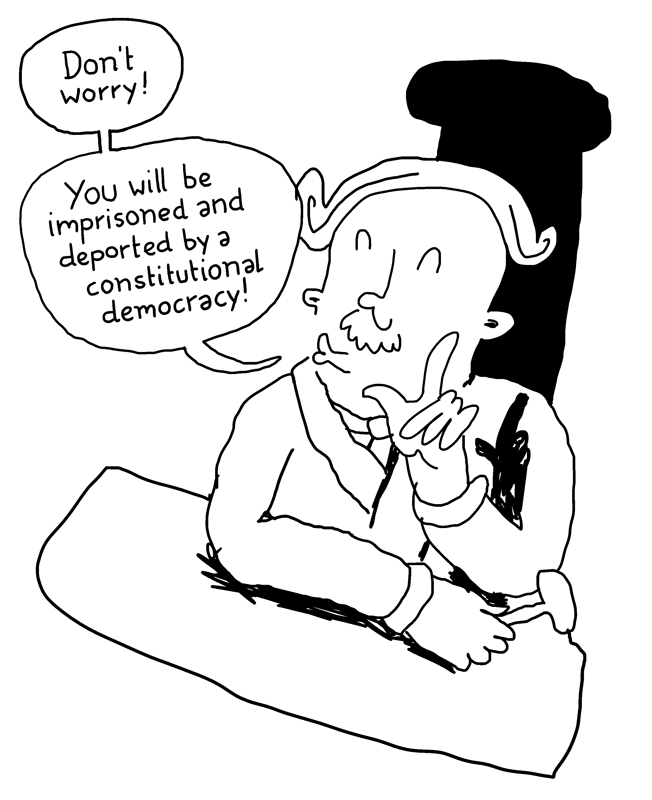 The first thing in the court hearing is the questioning of the accused person. The judge asks questions in order to get statements that justify the suspicion of going underground. E.g. if a person would like to stay in Switzerland. A harmless, „yes, I like it here“ can reach for three months of prison.
The first thing in the court hearing is the questioning of the accused person. The judge asks questions in order to get statements that justify the suspicion of going underground. E.g. if a person would like to stay in Switzerland. A harmless, „yes, I like it here“ can reach for three months of prison.
If the detained person doesen‘t speak german, the hearing will be translated. But the translation is oftenly not made to the mother language of the person, but in any language that the person is supposed to understand. If an arabic speaking person understands some french, the hearing can be translated to french. The authorities don‘t care, if the person has no chance to understand the juridical wording and the text of the law in this language.
Even though an accused person has the right to a free attorney, this is rarely ever provided. Most of the hearings are held whitout any advocate. For Basel there is one single advocate who is responsible for everyone who is in immigration detention.
Pseudo-democratic play
That is how a complex apparatus of juridic and democratic instruments is put to work, to legitimate the imprisonment and violent deportation of thousands of people. The Swiss State affords these prisons, tribunals and processes to justify this xenophobic practice in a pseudo-democratic framework. The multilayer bureaucracy takes the responsability of single persons und transmits it to institutions, so any person involved in the system, can deny any responsability for human tragedies.
The immigration detention also serves to demoralise people. In many countries the Swiss authorities can‘t deportate people by force, that‘s why people have to stay for months behind bars, until their morale is so low, that they prefere to leave „voluntarily“ to their homelands, instead of staying any longer in Swiss prisons without knowing why. Often one can hear the sentence, „here in Switzerland it is even worse, than in my country.“ This the exact goal of the authorities. To establish this tactics of demoralisation and the imprisonment of undesirables in a so called society of western values, the above described juridic-democratic play is needed.
For the imprisoned it must feel like in a novel by Kafka. They are being imprisoned for months without understanding what for, by a huge bureaucratic complex, in which everyone fulfills his/her function as a matter of course. Interrogated and listened to, but no matter what one says, at the end there are three months of imprisonment, whitout knowing what for – and without any possibility to avert the inevitable prolongation of the detention.
